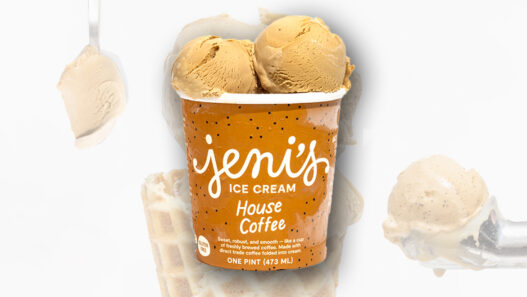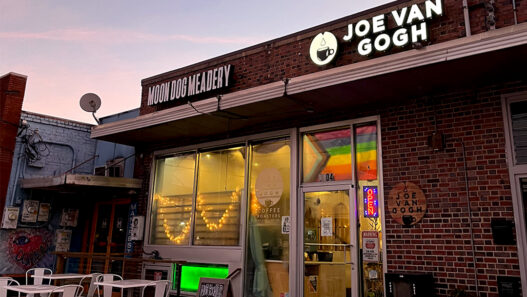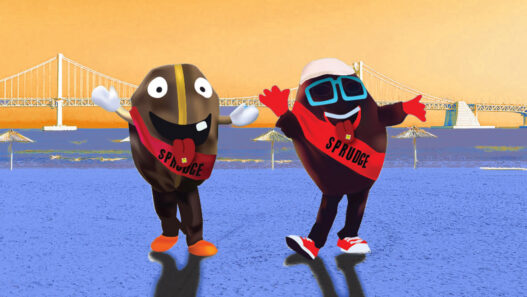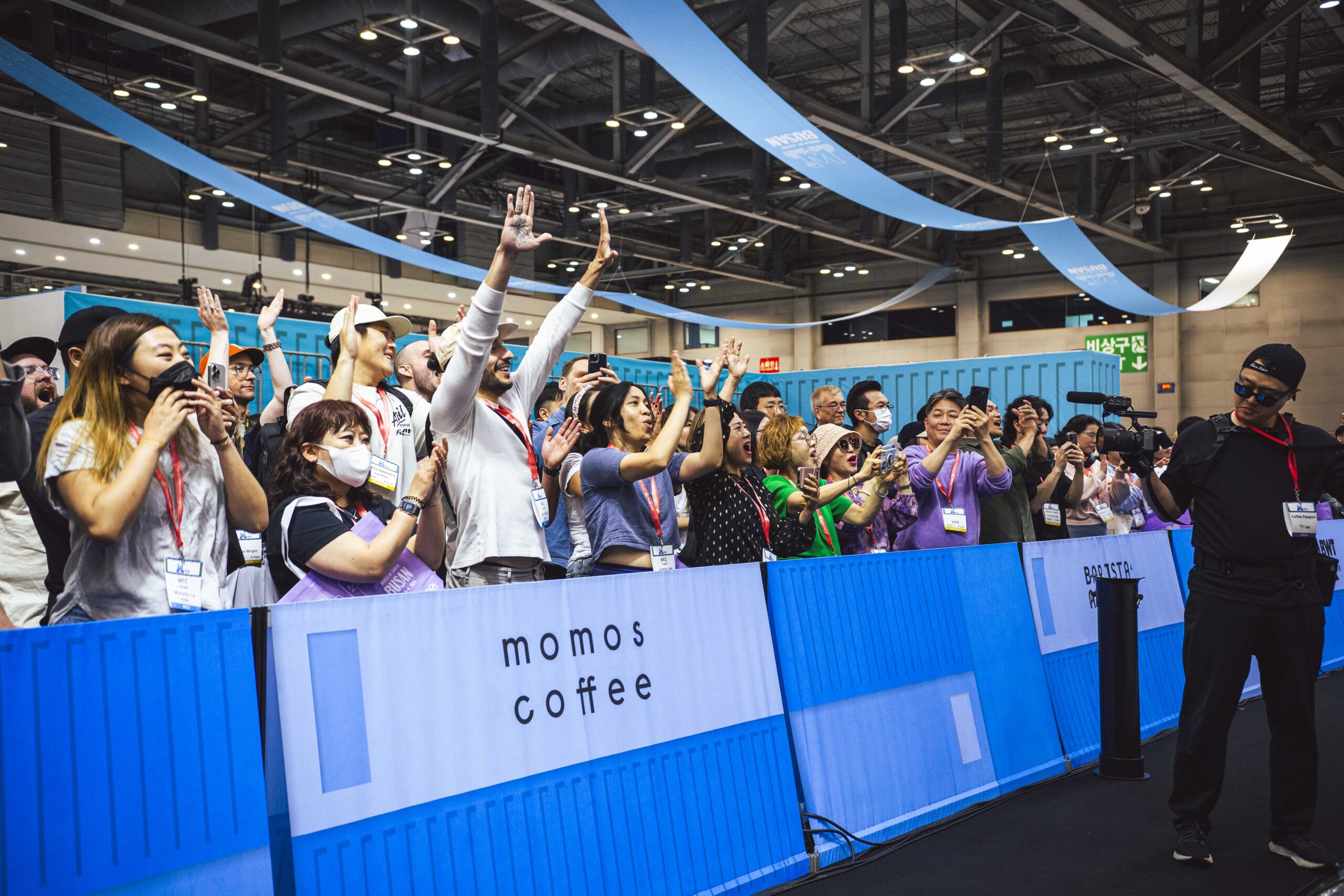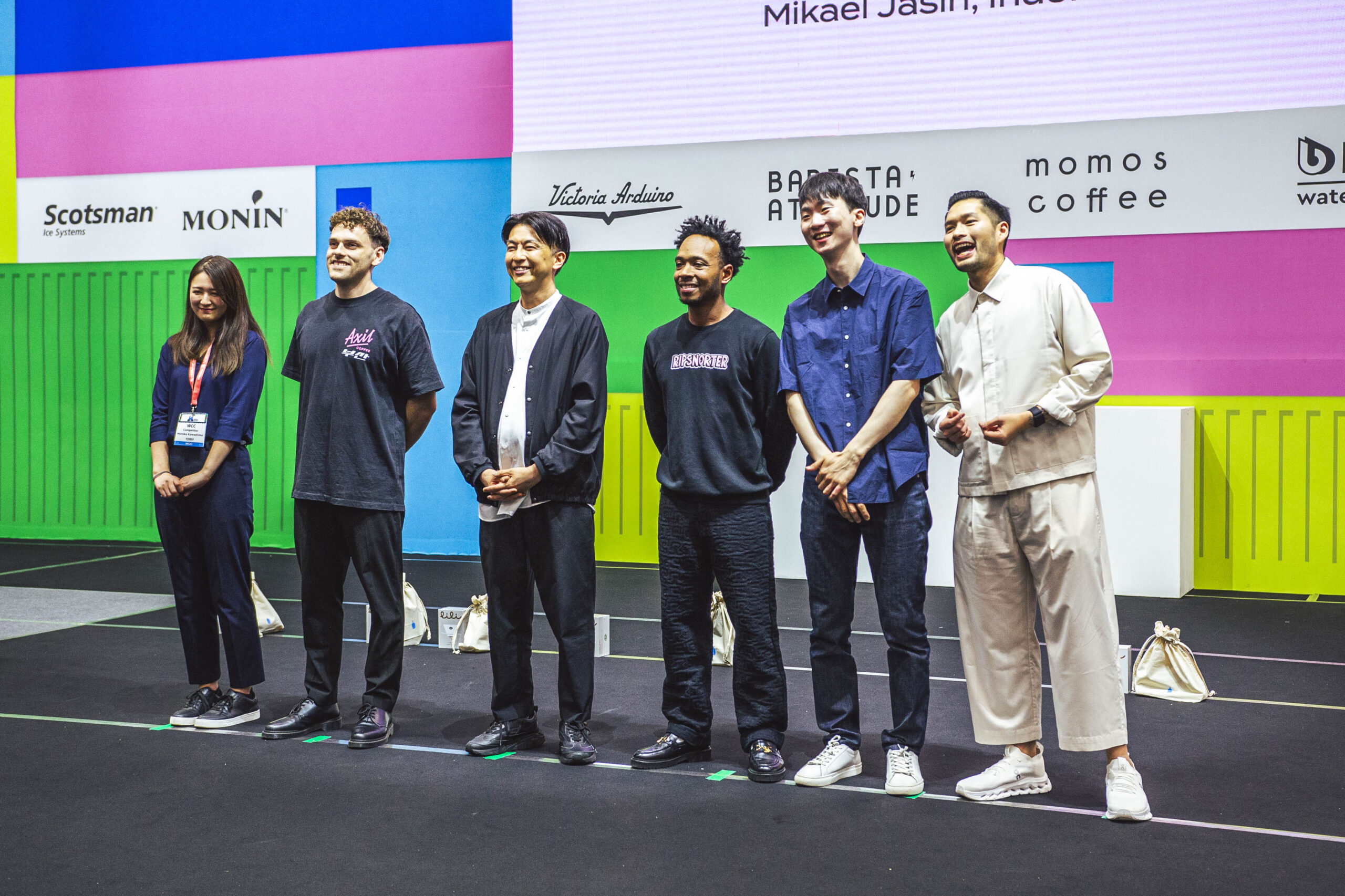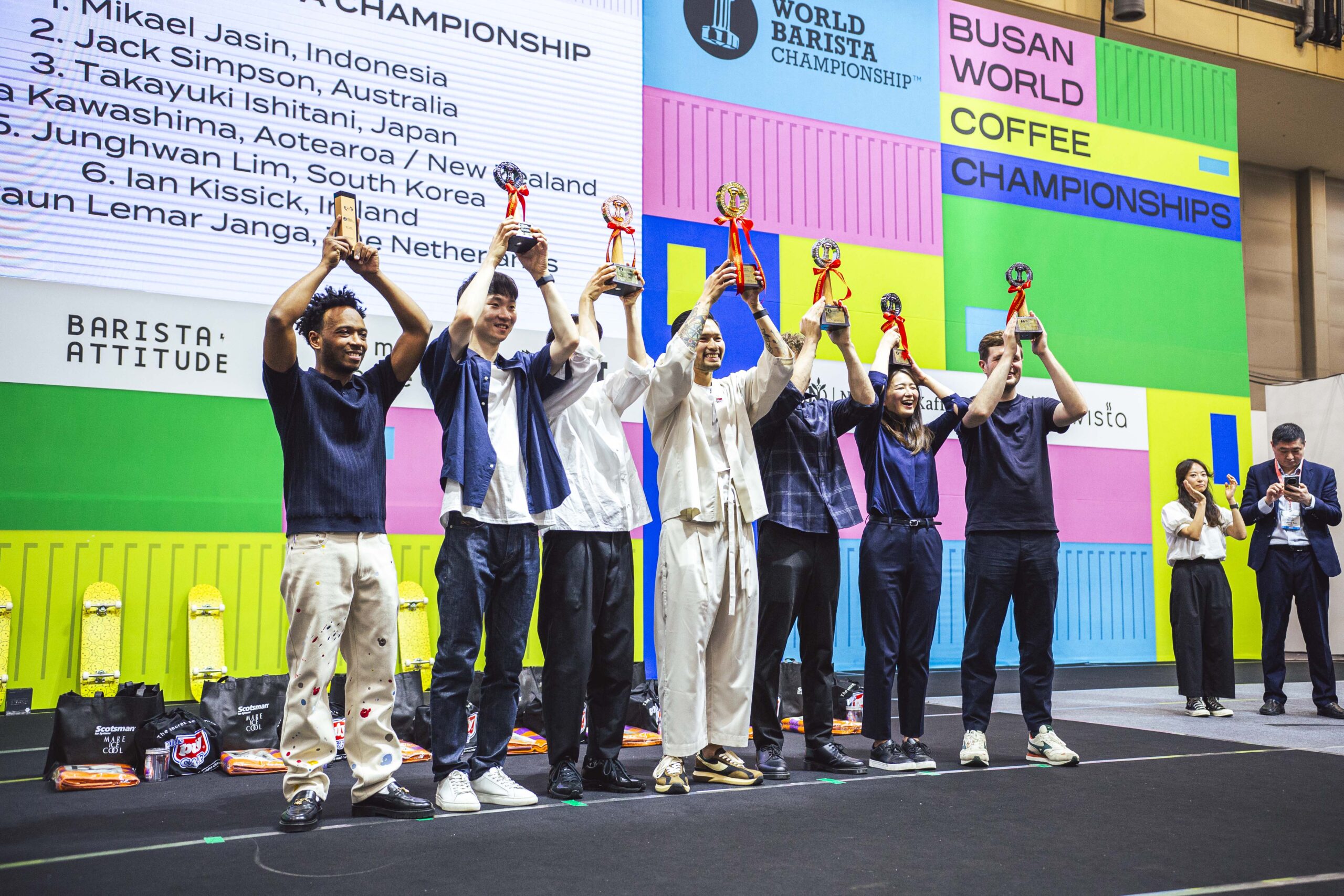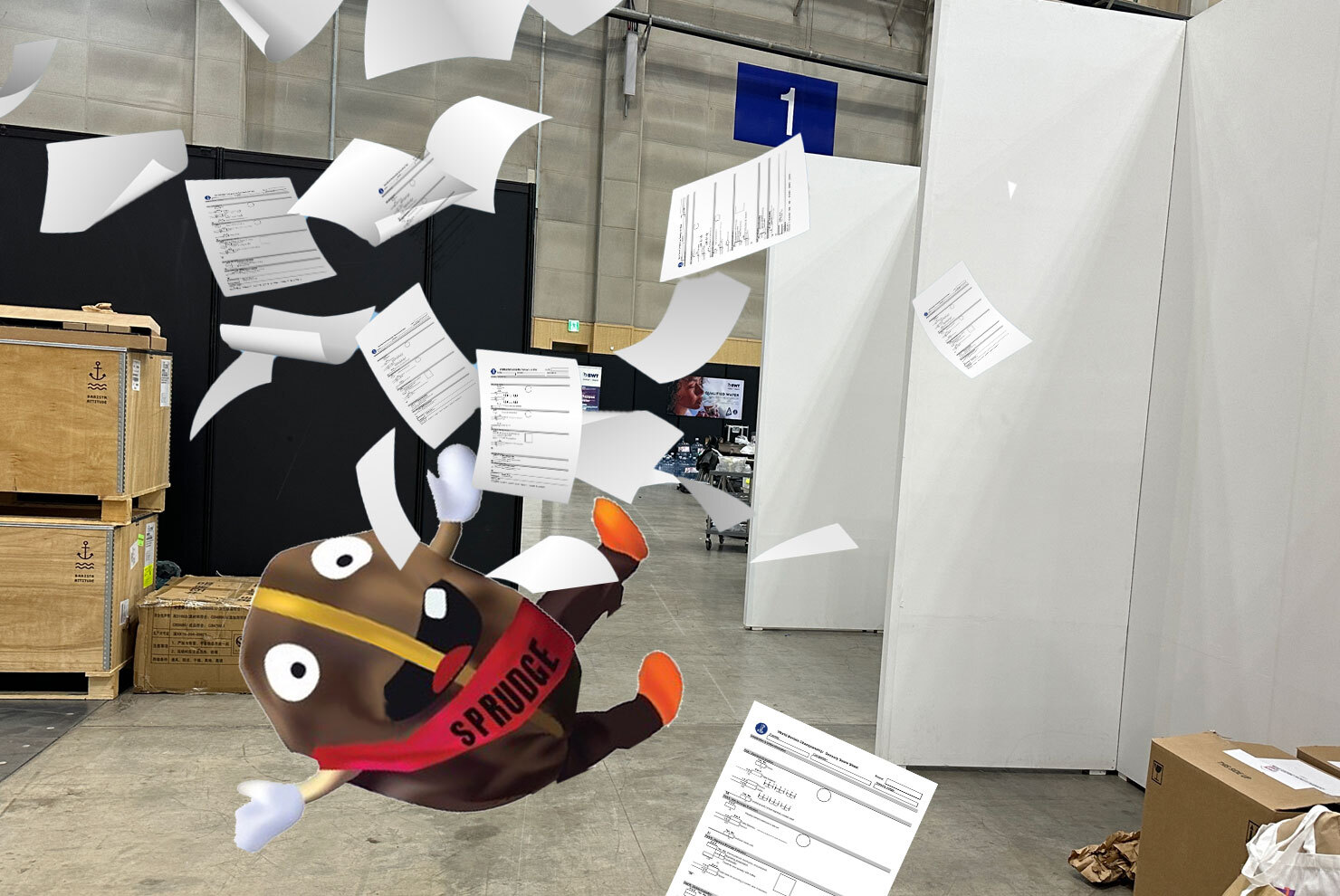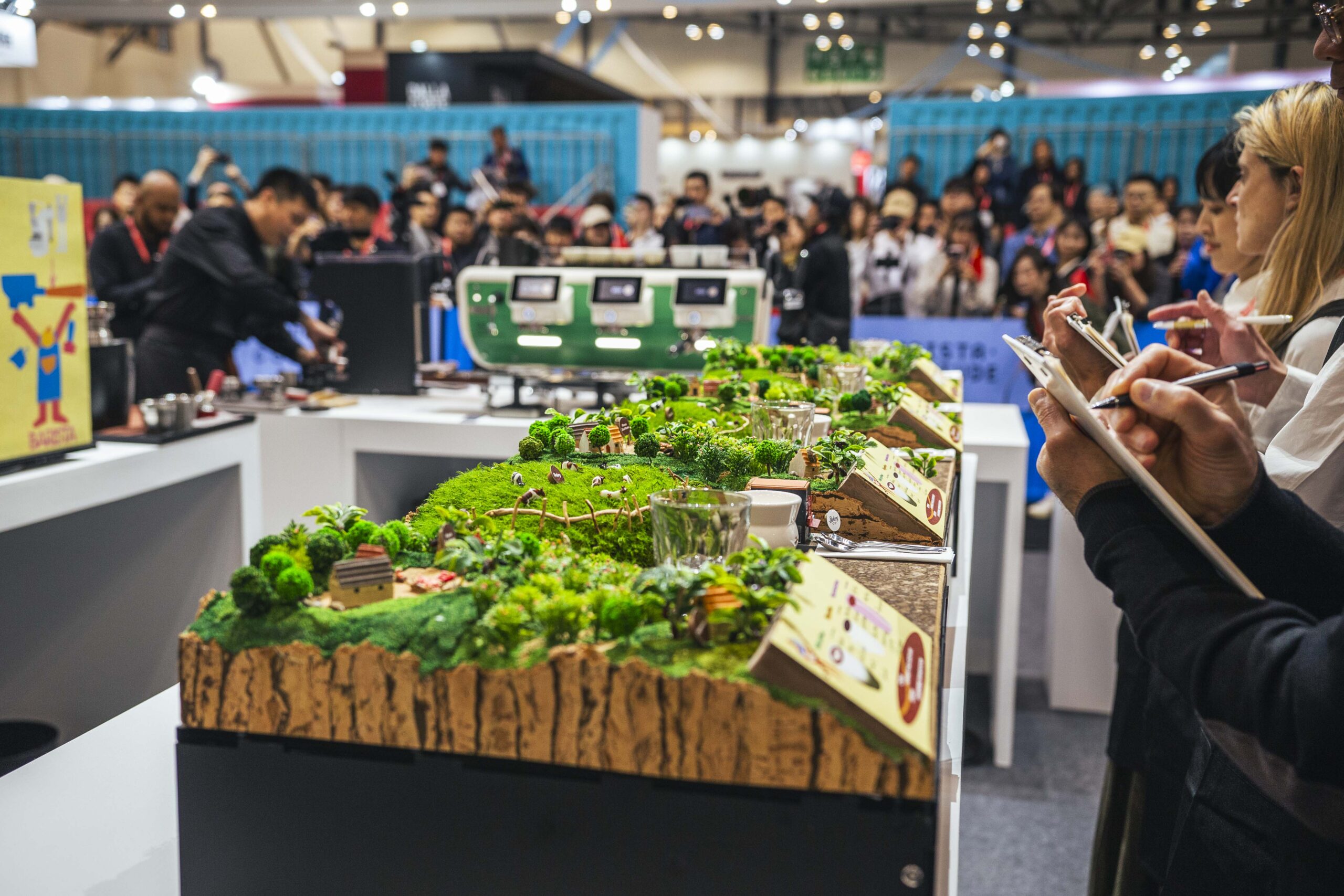Here we are, the Big Day, the culmination of a year’s worth of preparation. We’ve reached the Finals of the 2024 World Barista Championship. It started three days ago with 53 competitors from around the globe taking the stage here in Busan, South Korea, and nearly 18 hours worth of routines later, we are down to just seven.
There are a lot of heavy hitters competing today, including three former WBC Finalists in Indonesia’s Mikael Jasin, Australia’s Jack Simpson, and Japan’s Takayuki Ishitani as well as another returning champion, the Netheralands’ Zjevaun Lemar Janga. But even without past experience, it would be foolish to overlook New Zealand’s Honoka Kawashima, Ireland’s Ian Kissick, who snuck in at the last minute, or the hometown hero Junghwan Lim.
Who will come out on top is anyone’s guess at this point. What we do know is that it will all be decided in the coming out, playing out in real time on the stage of the World Barista Championship. We’ll be diving deep on each of the final seven routines, as they happen, so check back regularly for more updates. Let’s crown a champion, shall we?
Sprudge’s coverage of the 2024 World Barista Championship is presented by Pacific Barista Series and La Marzocco. Our coverage is supported by Created Co., Proper Syrup, Third Wave Water, and DiFluid.
Jack Simpson (he/him), Axil Coffee Roasters, Australia
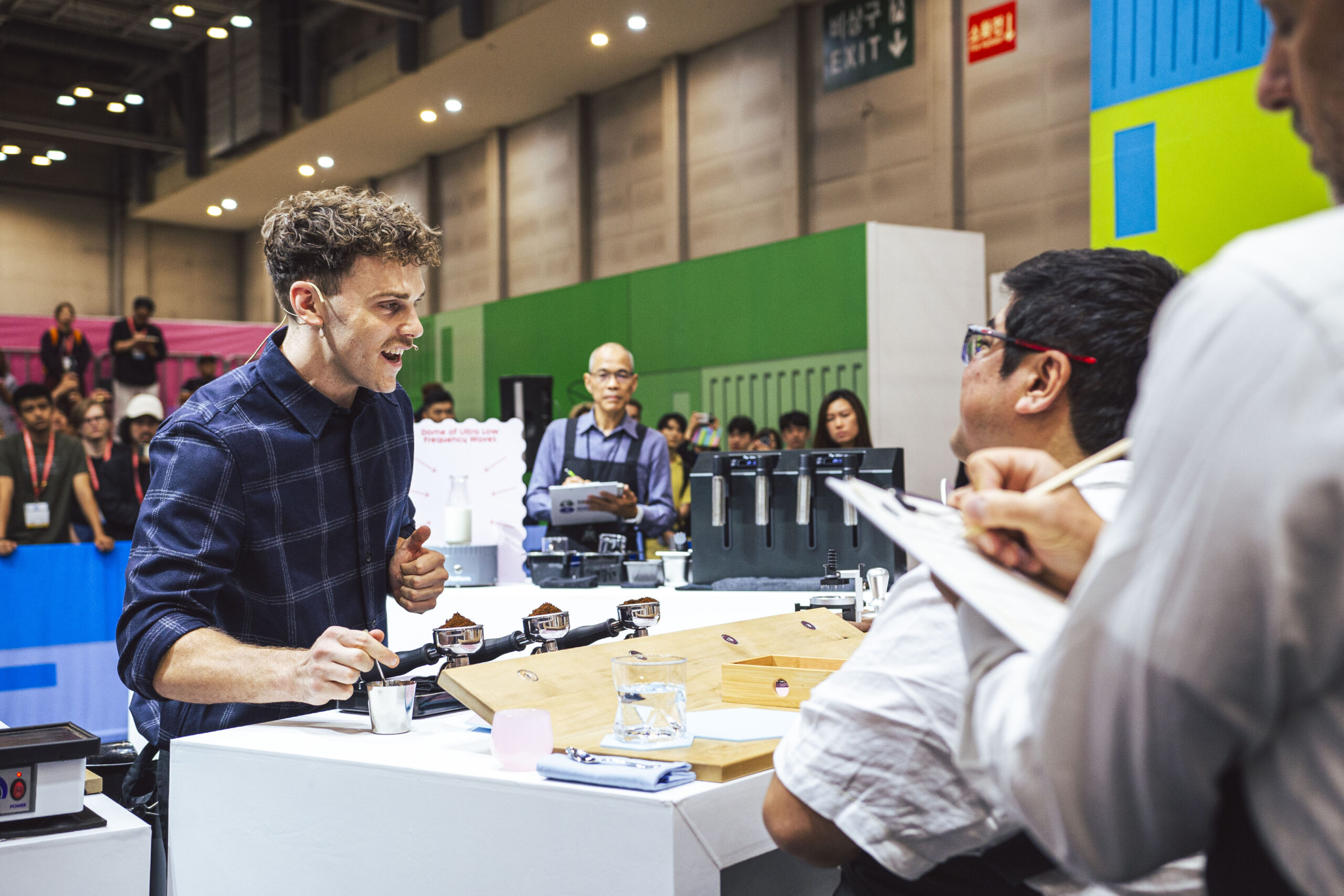
For Jack Simpson, the pursuit of perfection was limiting his progress. So this year, the Third Place finisher from the 2023 World Barista Championship isn’t looking for perfect, just improvement. He competes today with a natural processed, 150-hour anaerobic fermented Pacamara variety produced by Jonathan Gasca at Zarza Farm on Huila, Colombia, and a nitrogen macerated Gesha from Finca Deborah produced by Jamison Savage in Volcan, Panama.
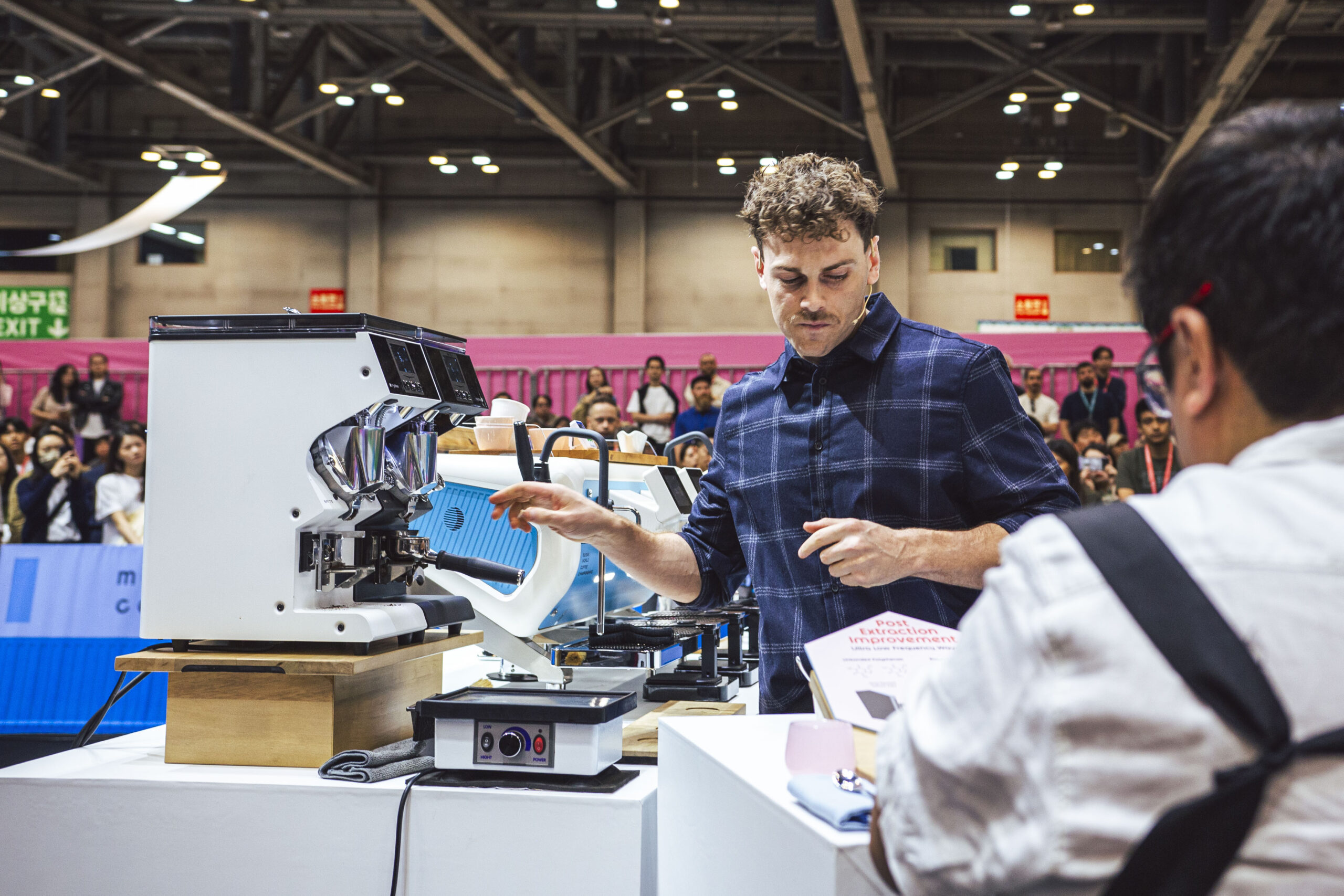
Simpson is treating his espresso shots with two seconds of 500hz ultra-low frequency electromagnetic waves that cause polyphenols and other bitter-tasting molecules to bind together, increasing the perception of sweetness and decreasing bitterness. Pulled at 20g in and 45g out in 29 seconds, the Gesha espressos have notes of blood orange, yellow peach, red cherry, and pineapple with a medium weight, juicy texture, and a rich finish. The espresso are served in cups with “evolving lip thickness,” with Simpson requesting judges drink from a specific side to accentuate the sweetness in the Gesha.
Simpson brings more of the wavy gravy to the milk course. He treats a full cream milk with ultra-low frequency magnetic waves for two hours, bonding together fat globules that give the milk a creamier texture, which he combines in a 90/10 blend with cryodesiccated coconut milk. As a 4:1 ratio milk drink, it presents flavors of sweet cherry, melted chocolate ice cream, and shaved coconut.
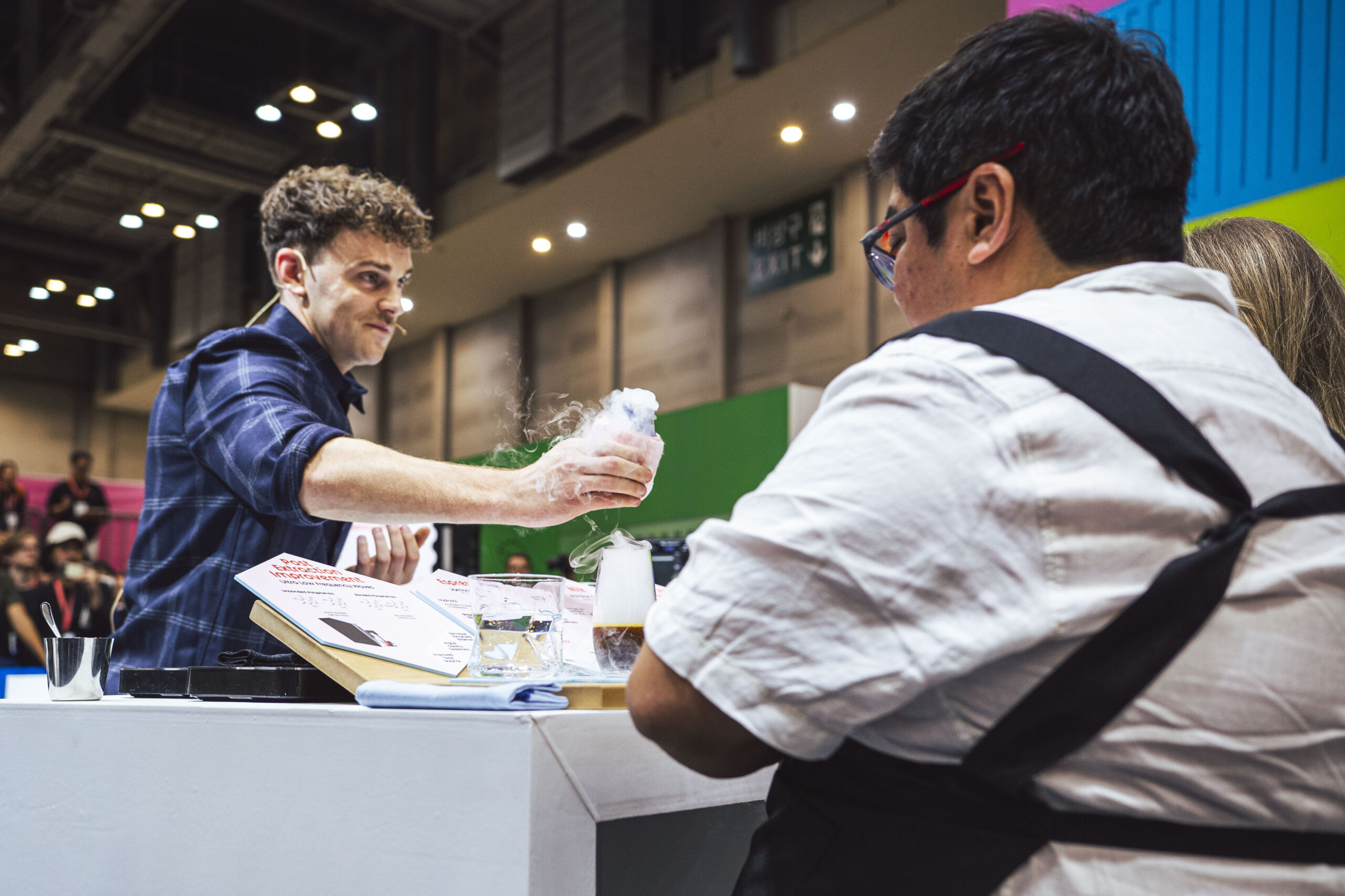
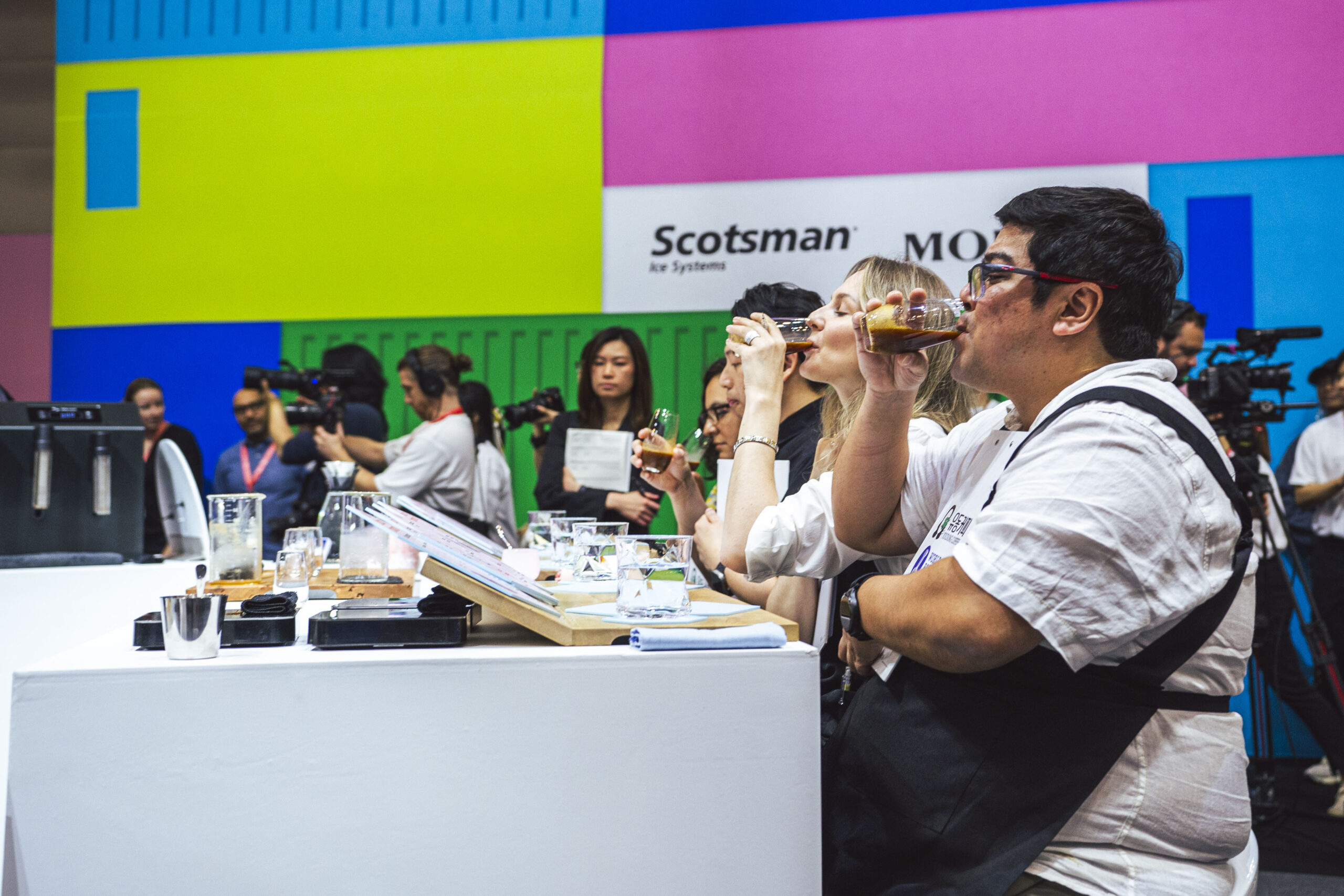
A blend of the Gesha and Pacamara espresso combine with a rotary distilled peach honey and a sparkling kinoto wave fermentation and are finished with a white peach and marigold flower fermentation aroma cloud, creating notes of mango, passionfruit, dried apricot, and orange soda. Jack Simpson calls time on the first routine of the 2024 World Barista Championship Finals at 14:56.
Zjevaun Lemar Janga (he/him), Ripsnorter Coffee, The Netherlands
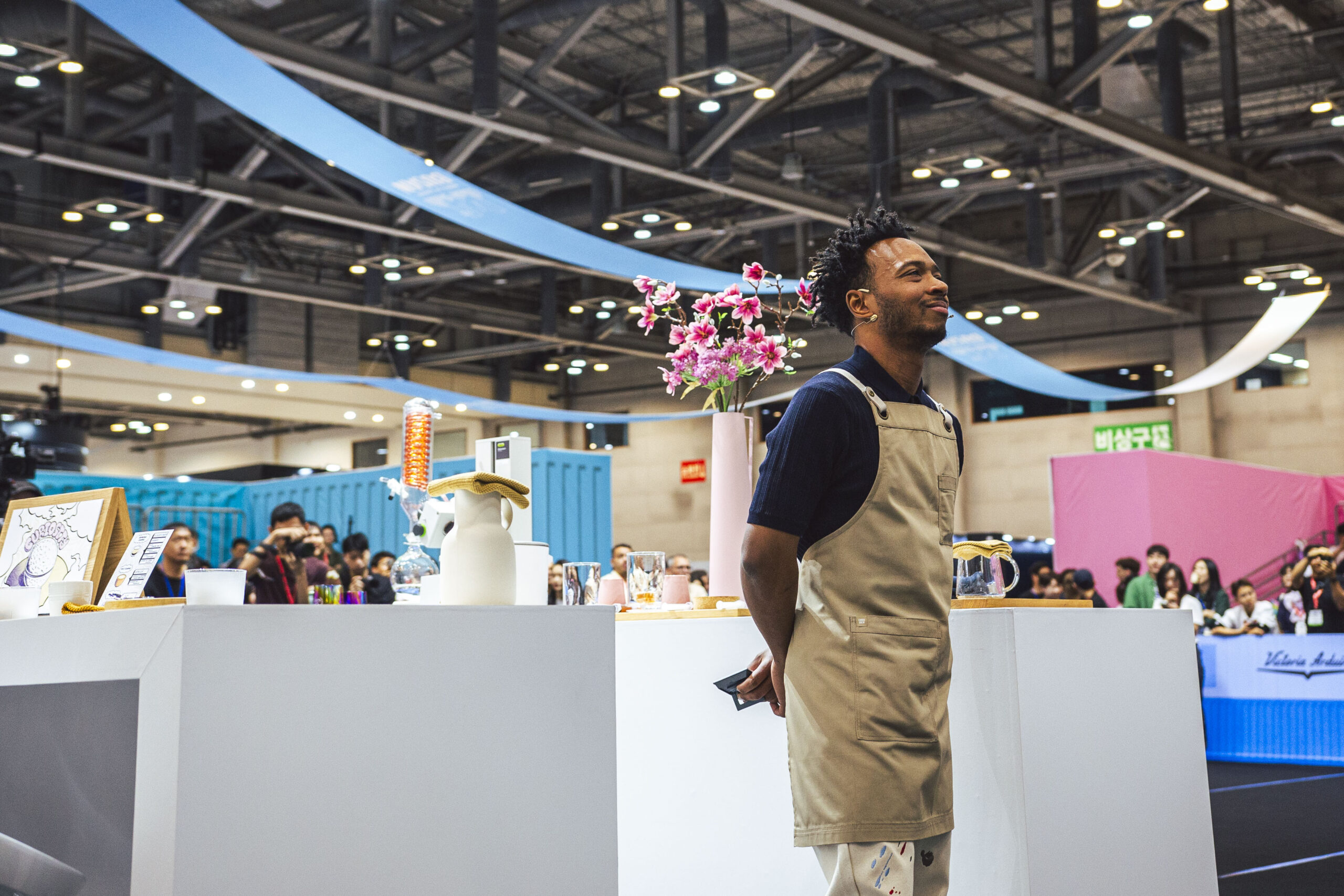
The path to innovation is paved with curiosity. And for The Netherlands’ Zjevaun Lemar Janga, there has never been a more innovated time in coffee than right now. To highlight this, Janga is using multiple versions of the same double-fermented, honey-processed Pink Bourbon variety produced by Aroma Nativo’s Luis Marcelino at 1,800MASL in Pitalito, Colombia: the first underwent a 96-hour lactic fermentation as the secondary ferment and the second with saccharomyces yeast added during the 96-hour ferment.
Using the first of the two Pink Bourbon variants, pulled at 21g in and 42g out in 20 seconds, the espresso course has notes of elderflower, mango, and pink grapefruit, medium thickness and a silky texture with a smooth and long finish. Janga serves his drink in asymmetric drinkware to enhance the aromatics, with instructions for the judges to stir 15 times before drinking.
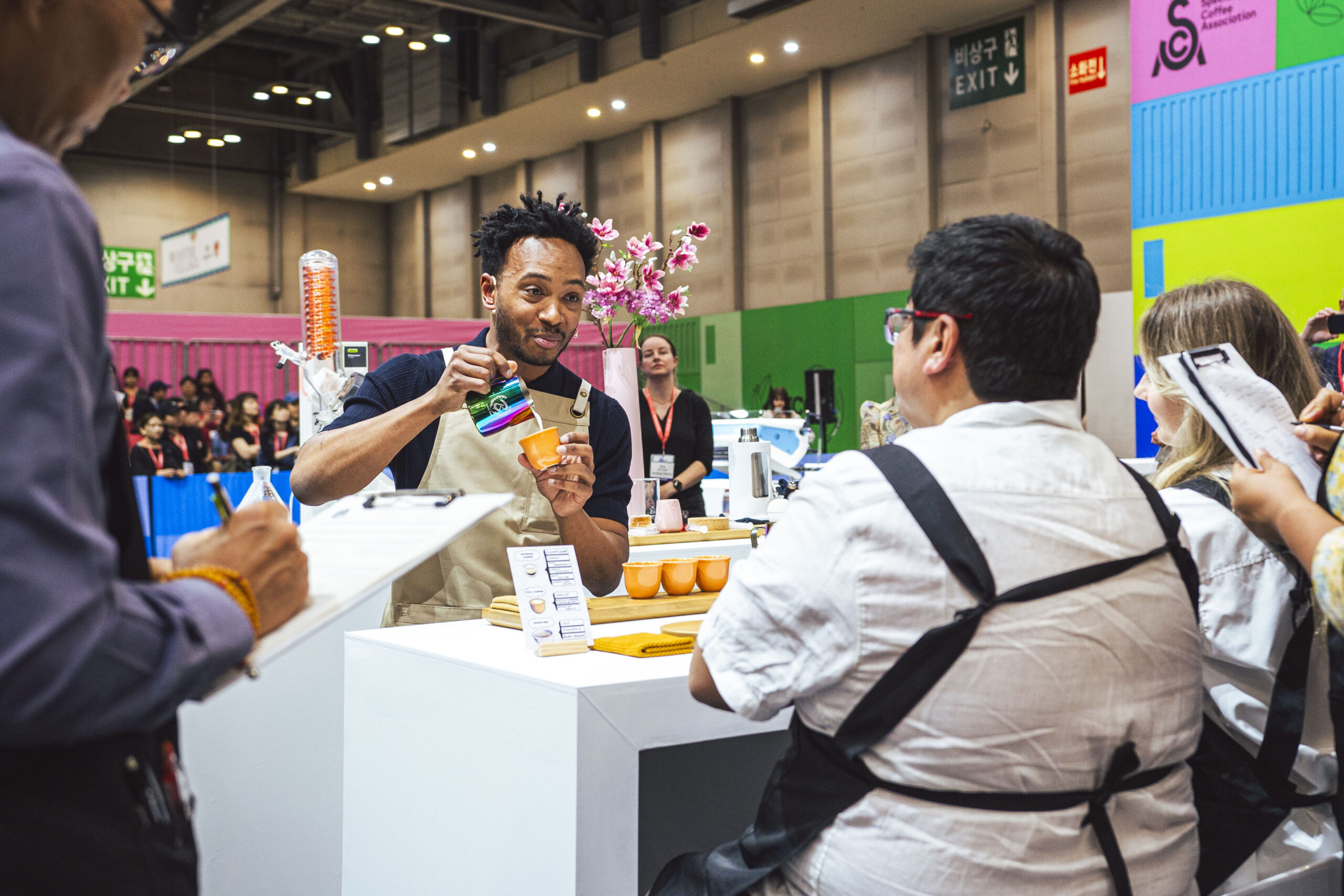
WDT tools are all the rage this year. Janga is using The Navigator, which automatically rotates the pins around the espresso bed for even higher levels of consistency in puck preparation.
For the milk course, Janga vacuum-distills—at a low 16 deg C to keep it from caramelizing—10% of the water from the full fat milk from Dutch MRY breed cows and replaces it with coconut milk. Using a 75/25 blend of the second coffee variant to the first, the 3:1 milk beverage has notes of apricot, caramel, and vanilla, reminiscent of crème brulee.
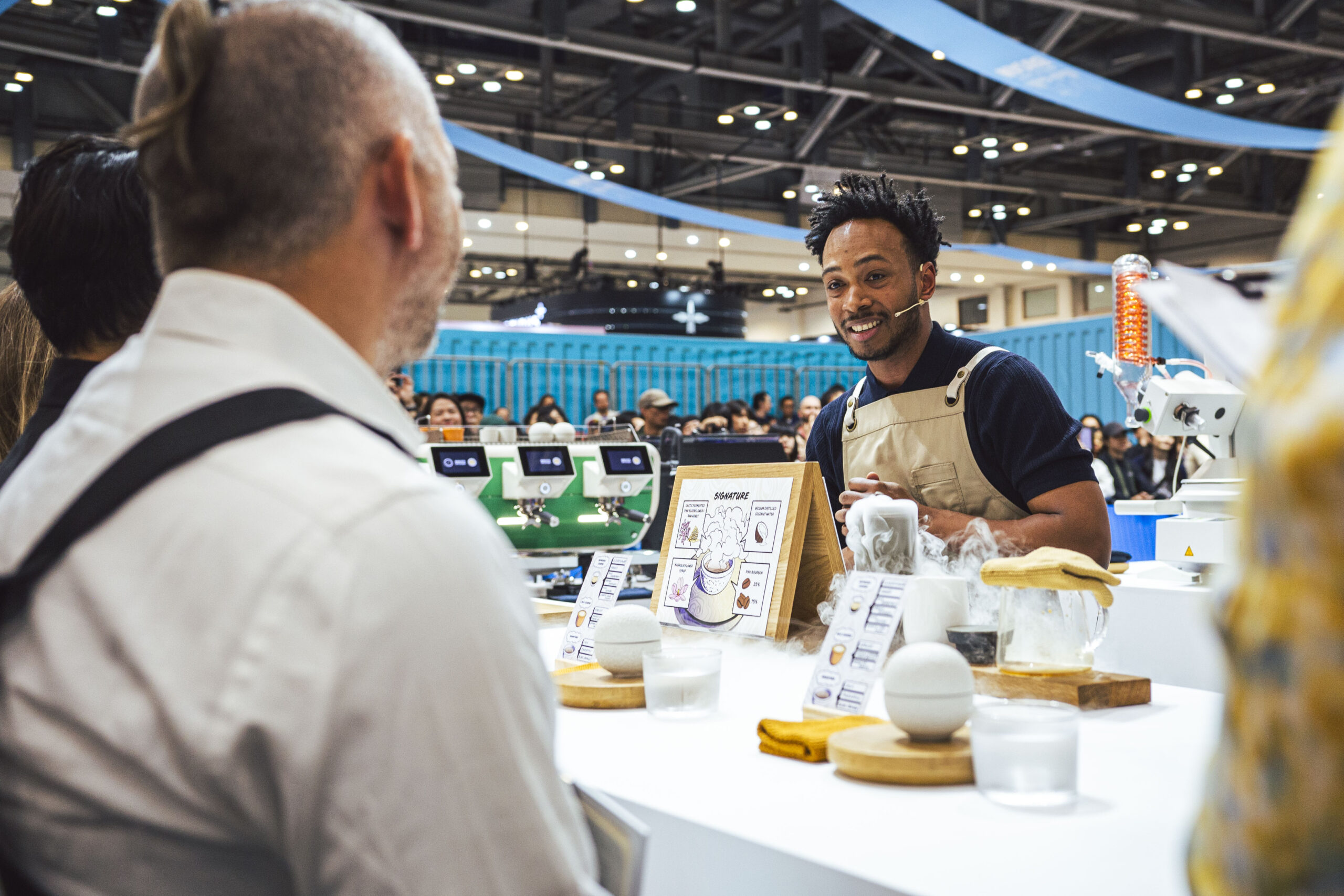
Magnolia flower syrup, a pink elderflower, raw honey, and salt lacto-fermentation, vacuum-distilled clarified coconut water, and Pink Bourbon espresso, all get nitro charged and served at 20 deg C and finished with Pink Bourbon aroma clouds and served in closed, spherical vessels, giving the signature beverage notes of cola, pineapple, and blood orange.
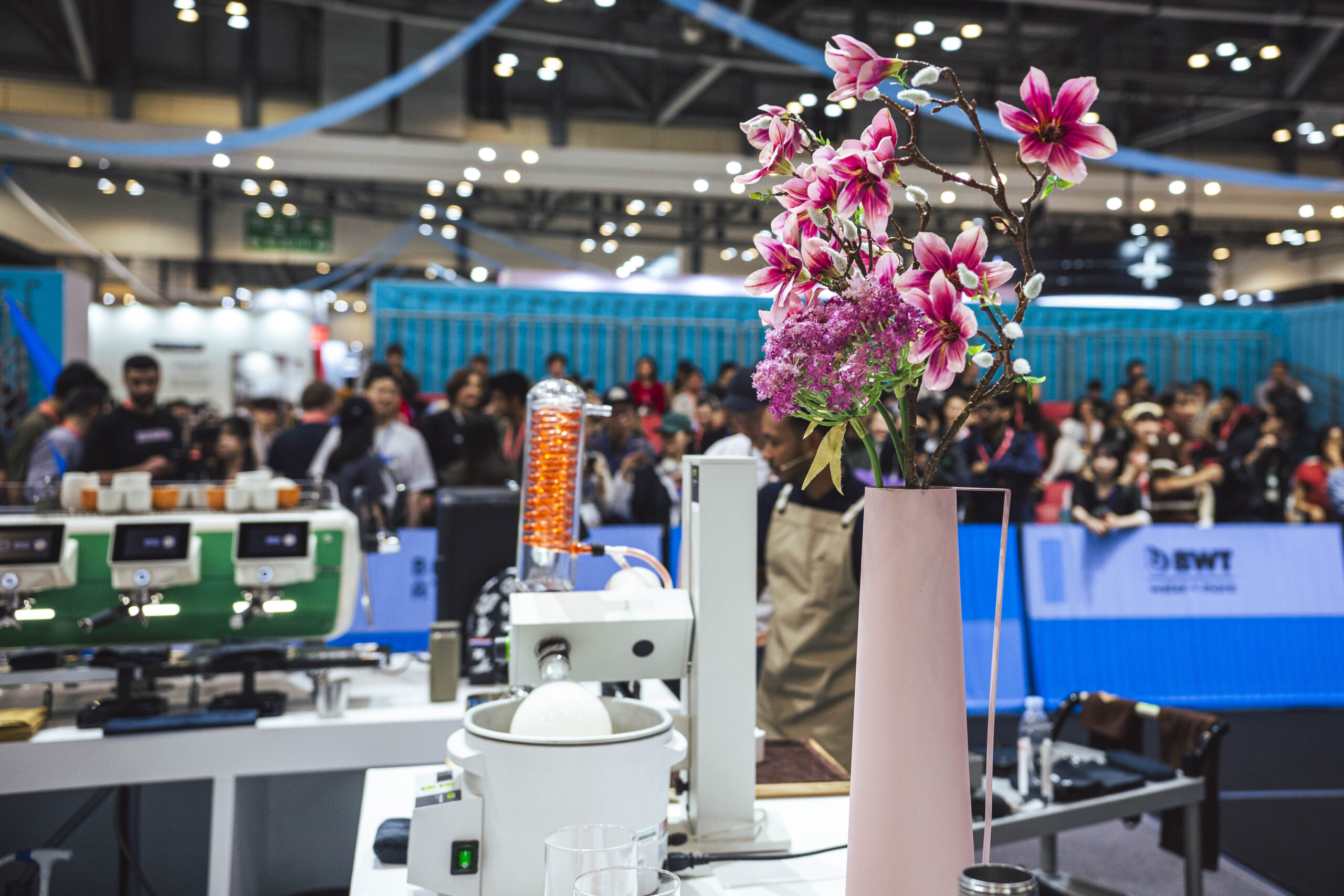
10 years after his first appearance on the World stage, Zjevaun Lemar Janga calls time on his World Barista Championships Finals routine at 14:55.
Honoka Kawashima (she/her), Frank’s Coffee, New Zealand

As a child growing up in Japan, Honoka Kawashima loved doing origami, taking a simple piece of paper and transforming it into something more beautiful and complex. Now, as an adult living in New Zealand, origami has come to represent Kawashima’s view on coffee and it is the theme of her World Barista Championship routine today.
Kawashima competes today with a natural processed Gesha and Maragogype hybrid called Maragesha from Finca Villa Betulia in Huila, Colombia, produced by Luis Anibal grown at 1,500MASL, roasted 30 days ago to help mellow the sharpness of the acidity. “Let’s simply call her Maria today.”
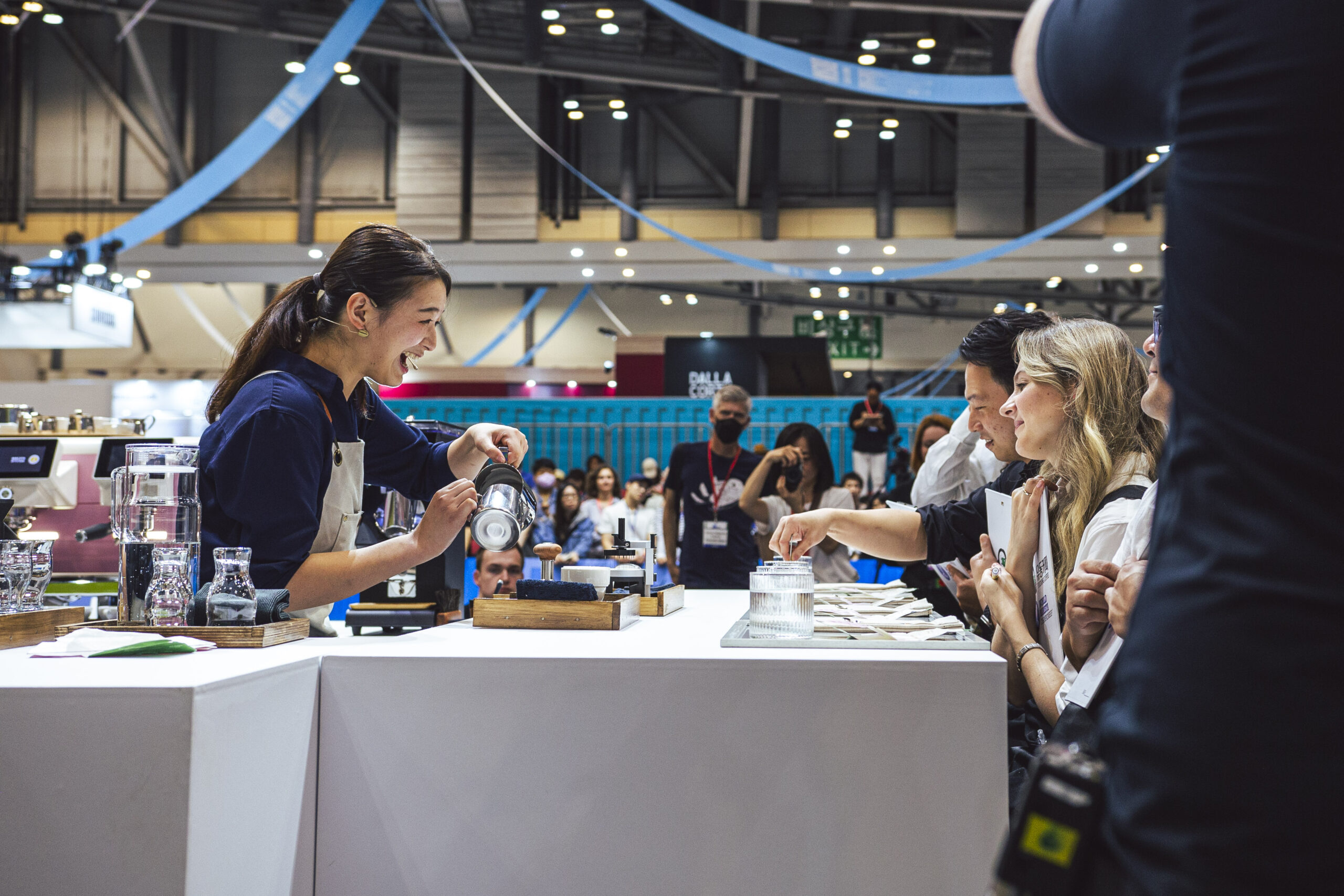
Kicking things off with the milk course, Kawashima blends a 90% high fat cow’s milk that was freeze-distilled to remove 50% of the water with a 10% almond milk to balance the saltiness. Steamed to 55 deg C and served in a 3:1 ratio beverage, stirred five times, the milk course has flavors of chocolate brownie, shortbread, and a raisin aftertaste.
Judges have been given a piece of paper to fold, following the instructions given by Kawashima.
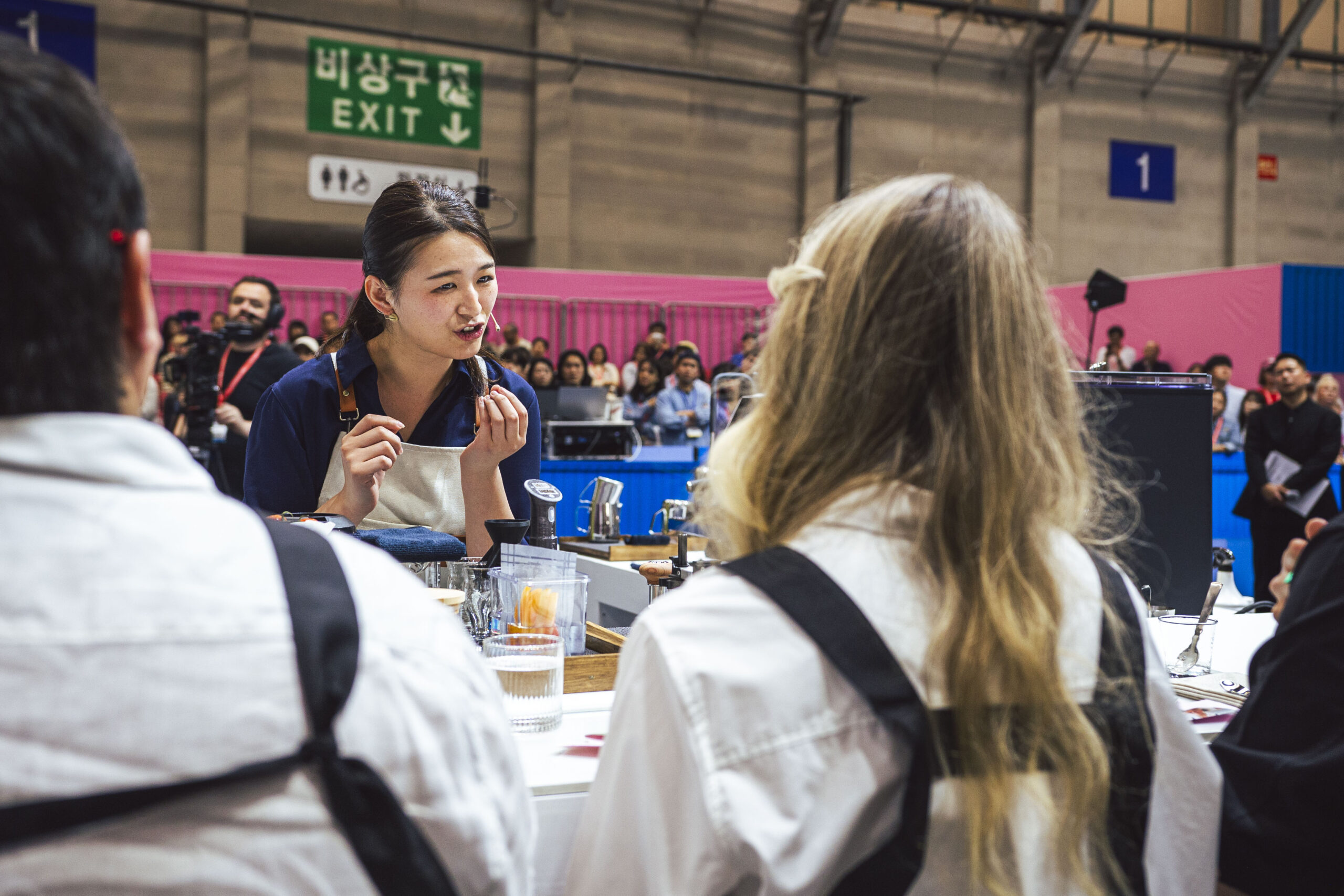
Moving onto the signature beverages the New Zealander combines an orange, red apple, and strawberry infusion, a tea/fructose simple syrup, tomato water, and distilled almond milk combine with espresso, all hyperchilled together to create notes of rock melon (cantaloupe), dehydrated sour plum, and a ginger ale aftertaste.
Pulled at 19.5g in and 50g out, the recipe she used for all her courses, the espresso get flash-chilled with metal spheres to 45 deg C and stirred five times for notes of pink grapefruit, pineapple, and a hibiscus aftertaste, with a medium body and a silky texture. The origami the judges were folding is revealed to be a shape of a heart.
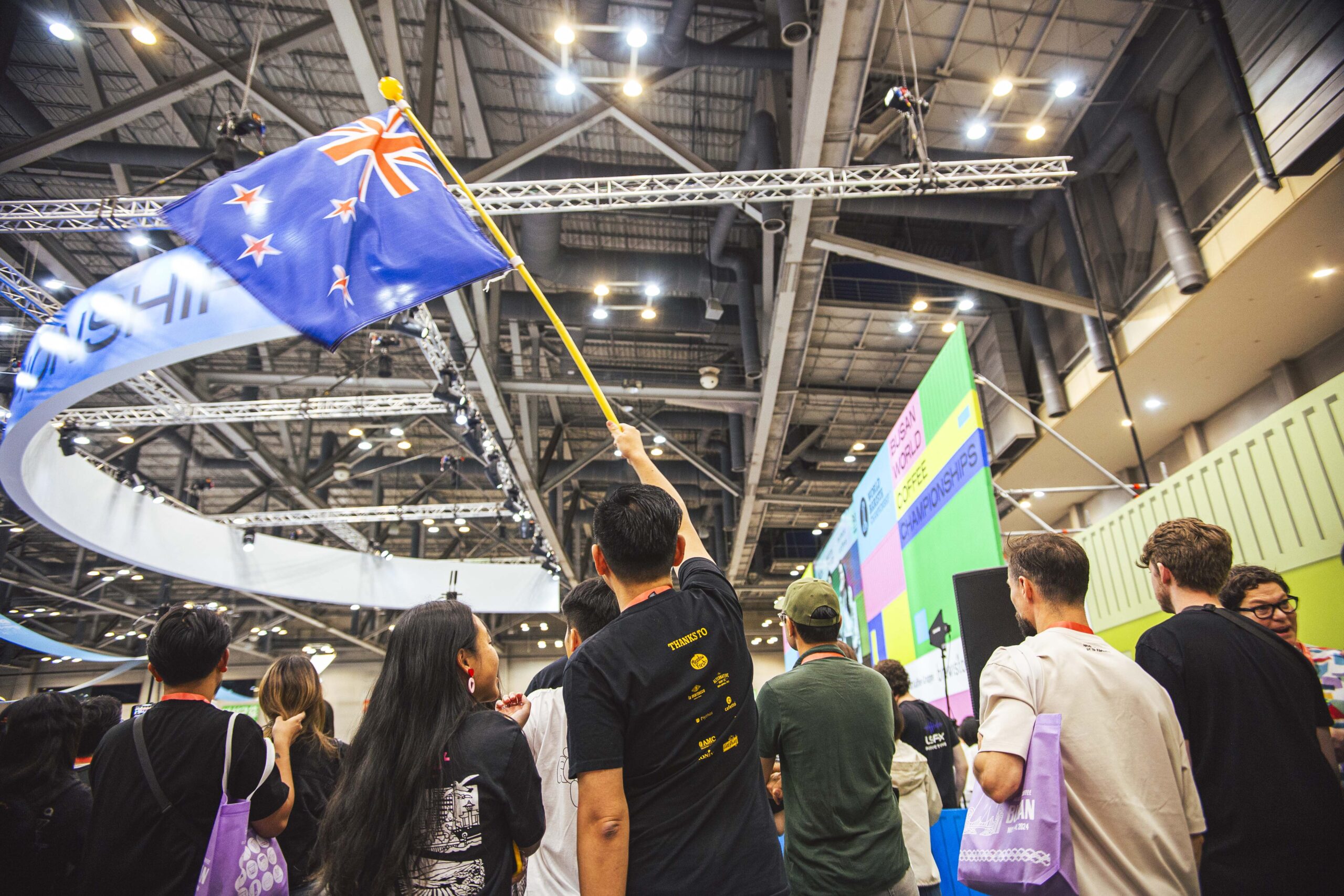
Honoka Kawashima of New Zealand calls time at 14:27.
Junghwan Lim (he/him), Aerycoffee, South Korea
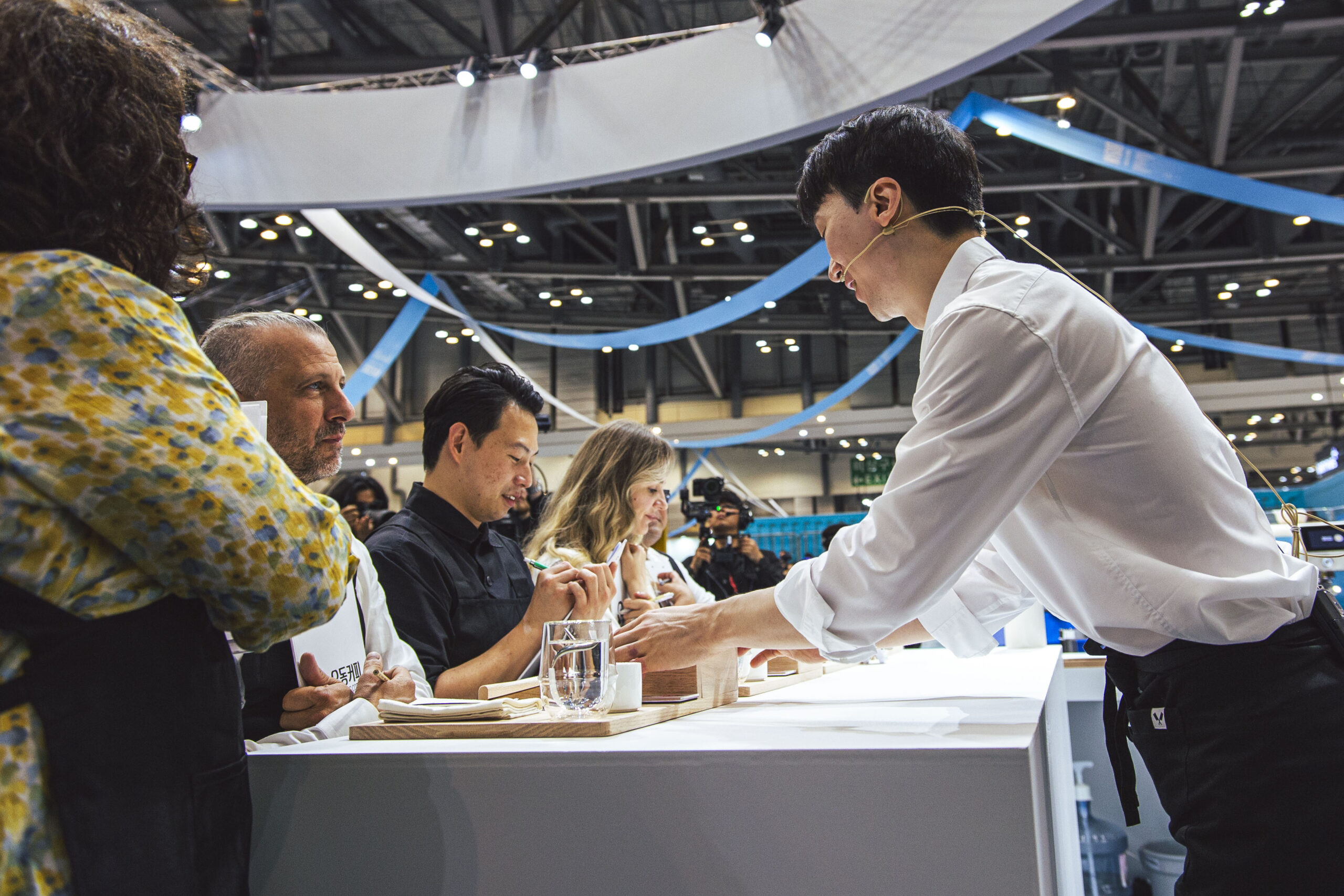
For Junghwan Lim, the theme today is pixels, how they break down and how they are used to create a larger image. These small bits are building blocks, the components of a grander array. The first pixel is Lim’s larger picture is his coffee, a natural processed Sudan Rume variety grown at 1,900MASL by Rigoberto Herrera at Finca Las Margaritas in Cauca, Colombia.
Pulled over chilled spheres at 20g in and 50g out with 92 deg C water, the Sudan Rume as an espresso has notes of ruby grapefruit, muscat grape, and lemongrass, with a green apple aftertaste, a juicy, silky texture and medium sweetness and a medium-high acidity.
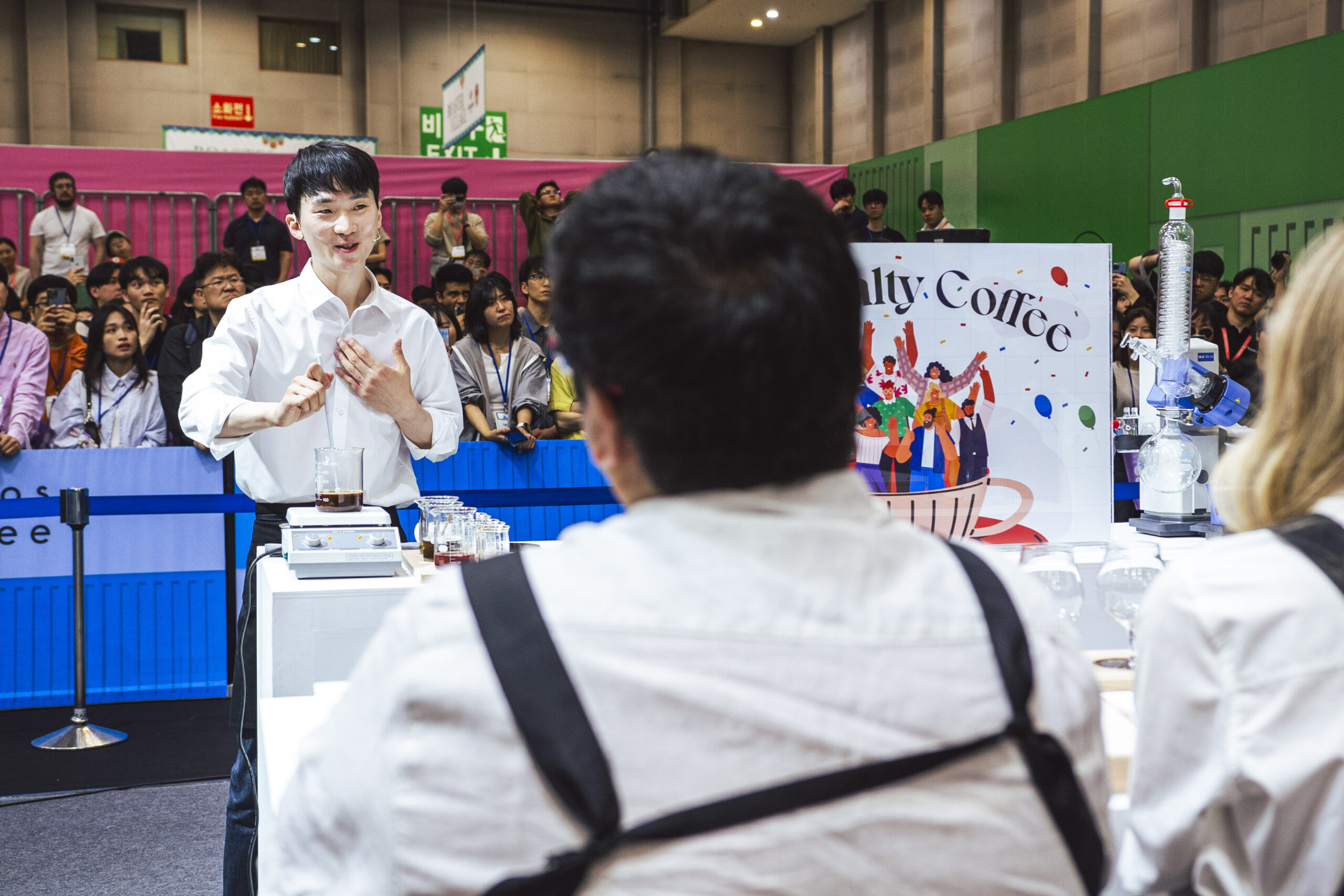
Lim, who is from right here in Busan, brings another novel distribution tool to WBC. His has a built-in vibration motor that promotes a higher sweetness and smoother texture in the espresso.
For the milk course, Lim distills his full fat cow’s milk down to a 70% concentration and steams it to 50 deg C, creating a drink (stirred five times) with a creamy texture with flavors of vanilla, caramel, coconut, and a milk chocolate aftertaste.
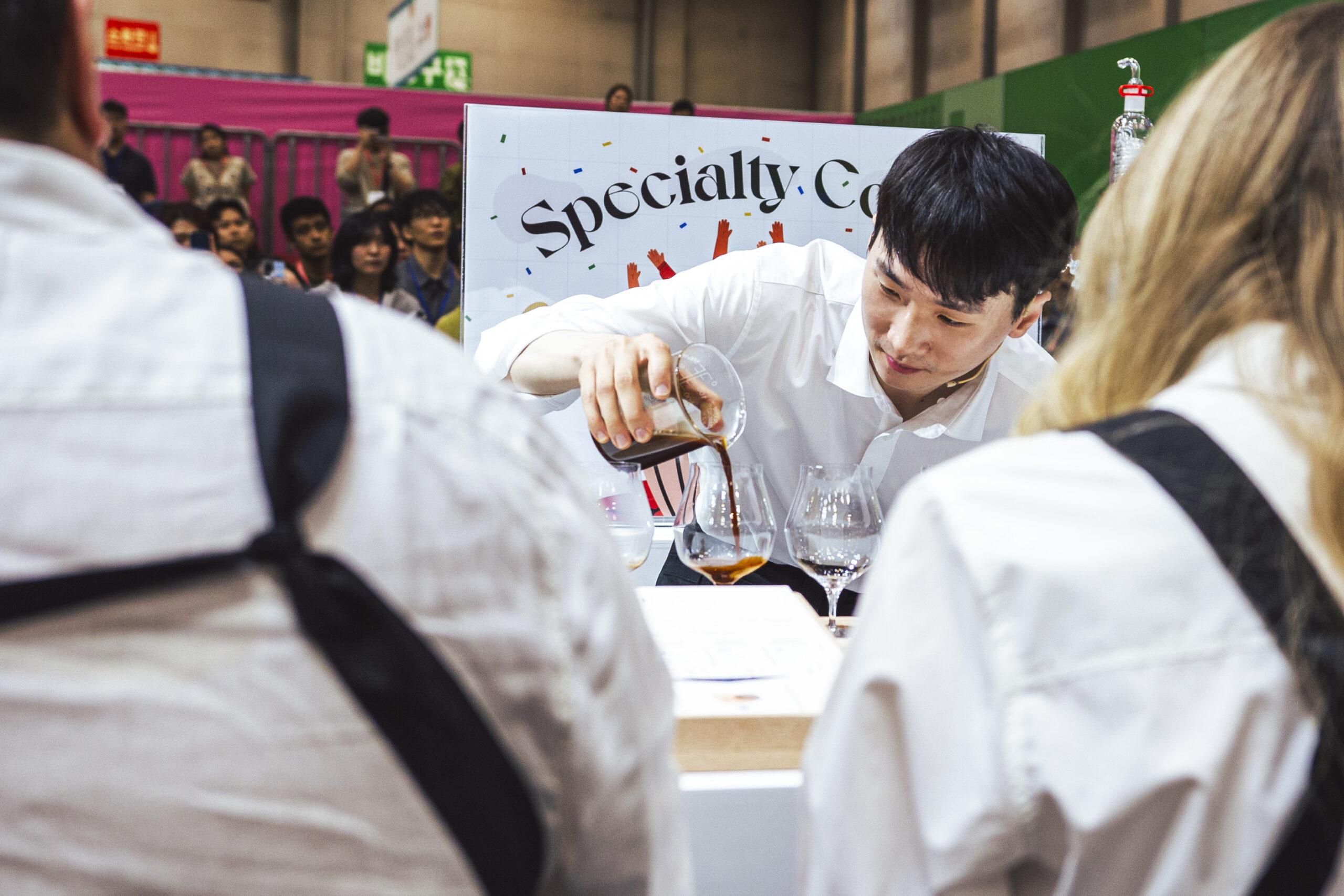
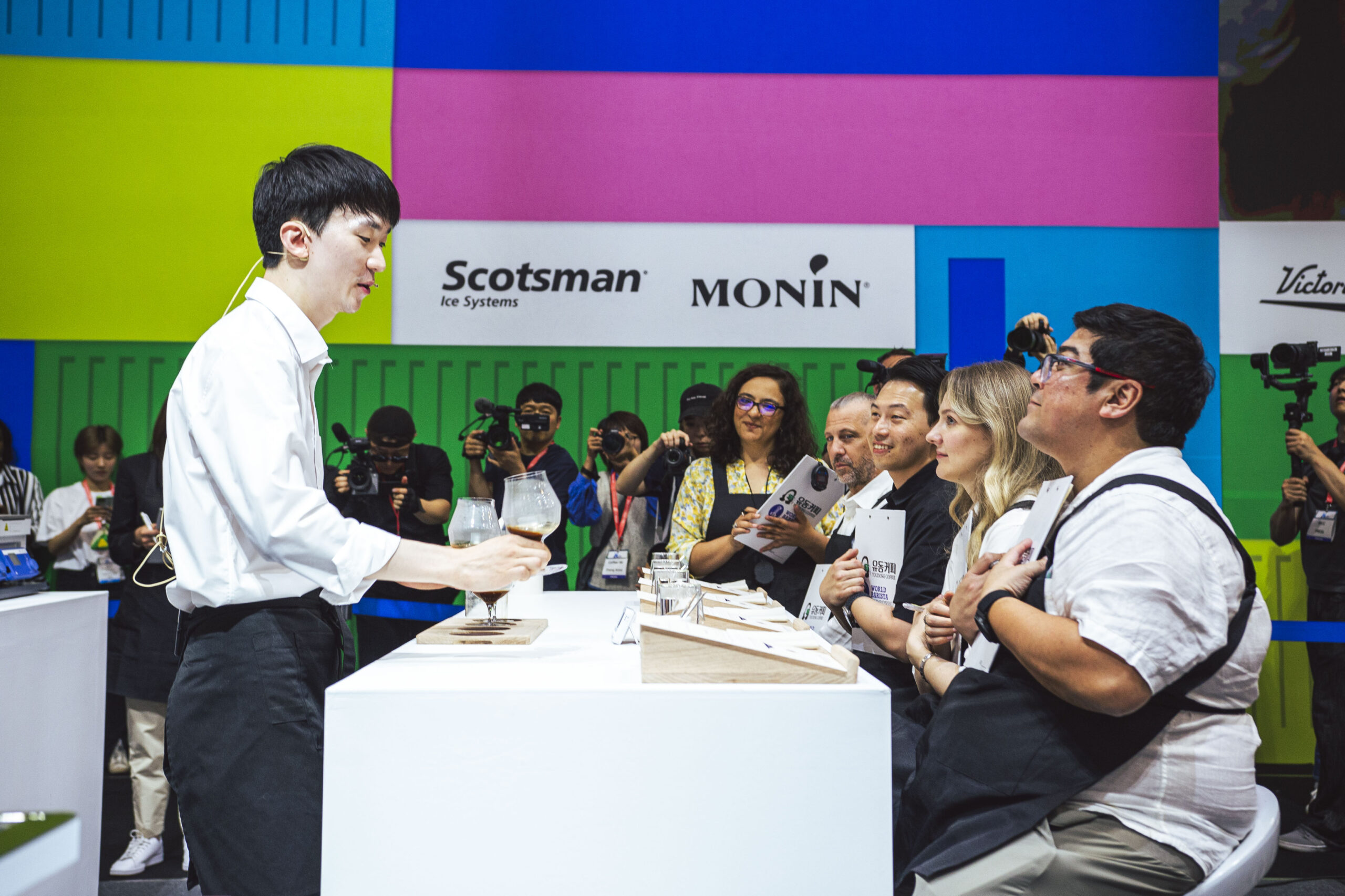
Espresso, blueberry and passionfruit juice tropical culture, coffee saccharum, and a cardamom and cinnamon water are combined and served warm in a wine glass creating a drink reminiscent of Pepsi Cola, including flavors of blood orange, black tea, and cola, with a long-lasting ginger finish, a medium body, and a juicy and silky texture.
Mikael Jasin (he/him), So So Good Coffee Company, Indonesia
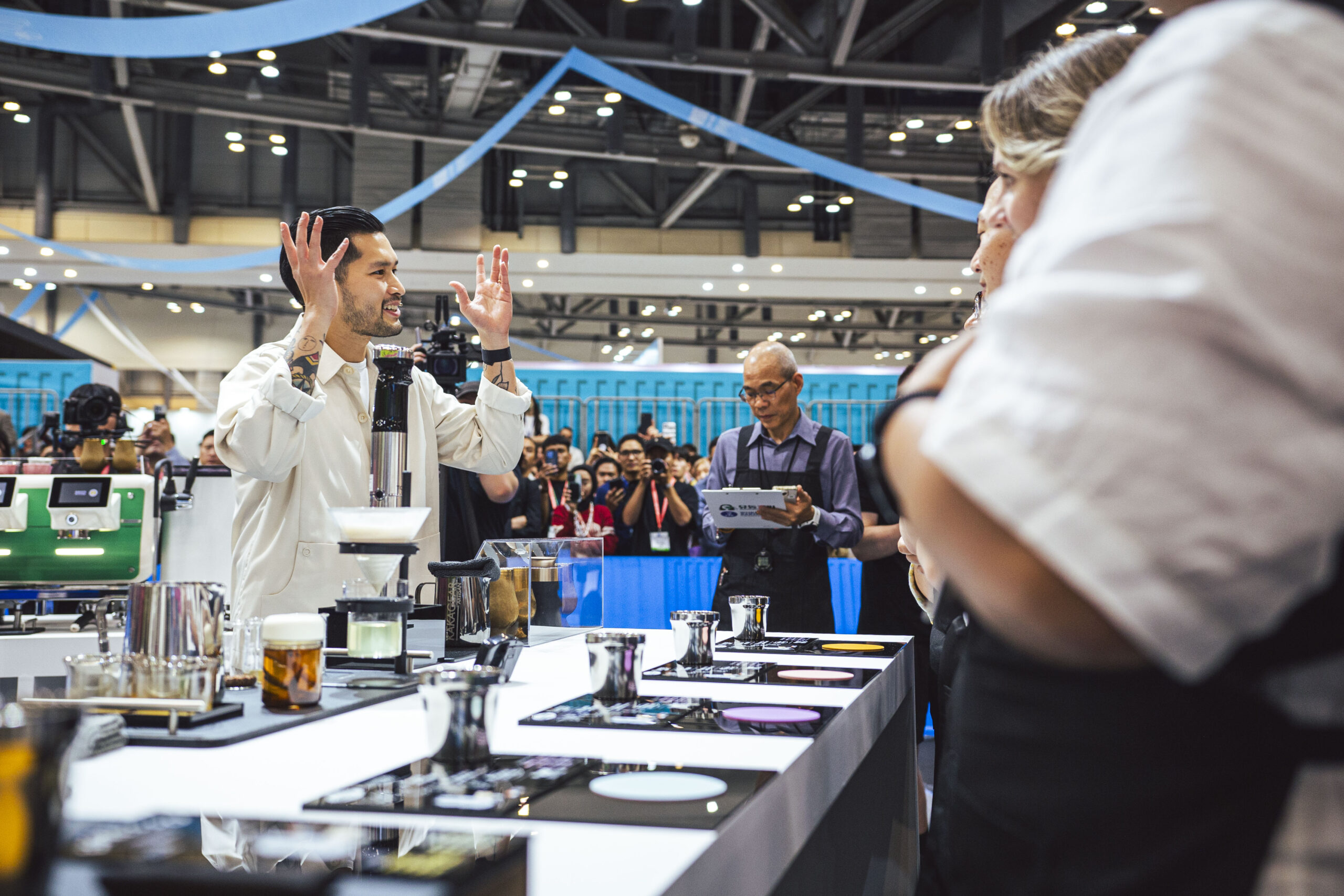
Burnout is real, even at this level of competition. It led Indonesia Barista Champion Mikael Jasin to step away from competition following his last appearance in the 2021 World Barista Championship. But through taking time away and practicing mindfulness, Jasin is back and ready to return to the World Barista stage.
Jasin compete with two different coffee today: an Ethiopian landrace variety known as Aji, yeast inoculated and thermal shocked and grown on Finca El Diviso in Huila, Colombia, and a Gesha produced on Finca Deborah in Volcan, Panama.
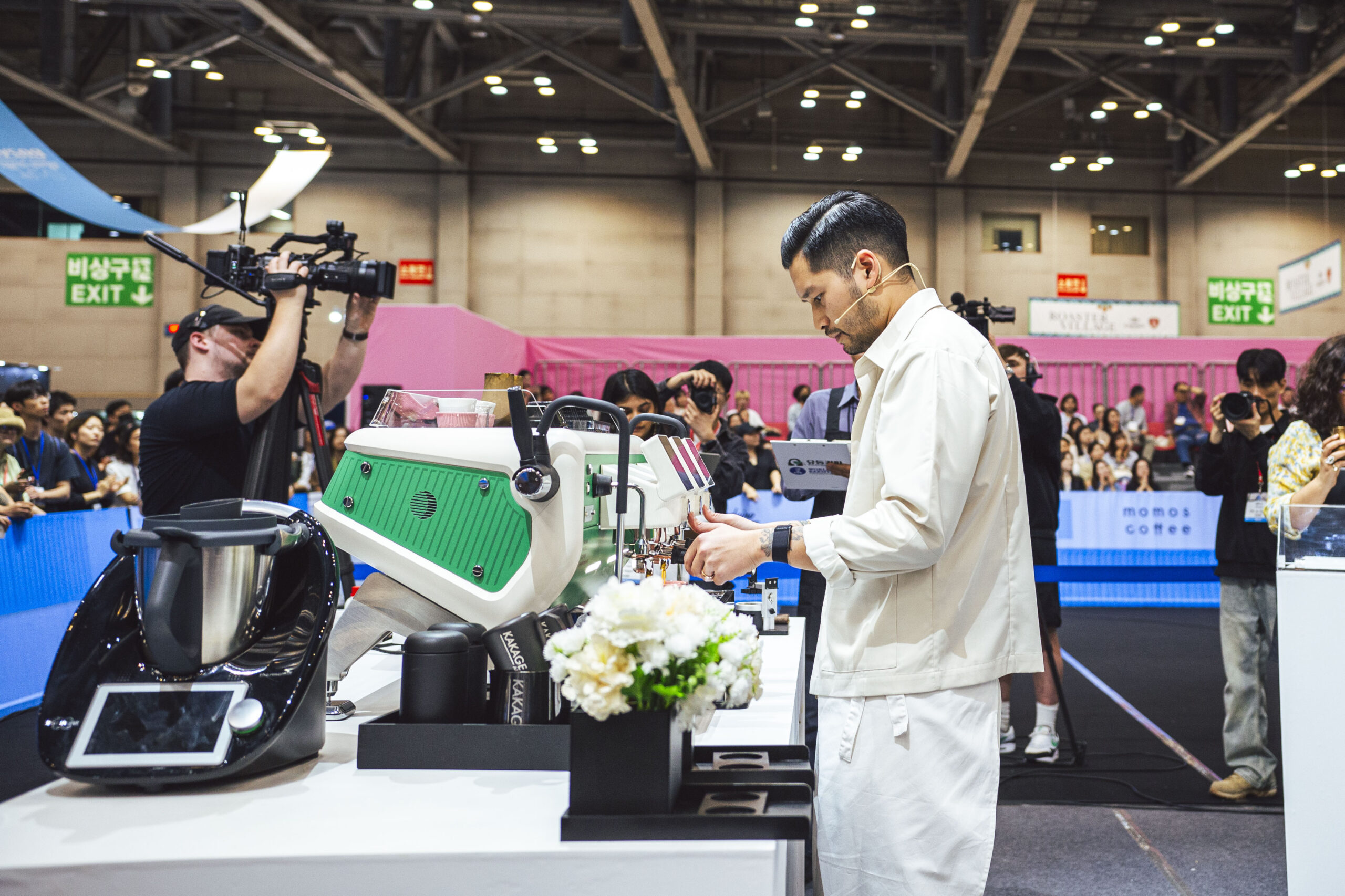
Starting with the Aji pulled at 20g in and 30g out for 25 sec, Jasin creates a three-milk blend consisting of 60% dairy, 20% cashew milk, and 20% oat milk, all evaporated to an 80% concentration, and served in a 3:1 for flavors of peach liqueur, cantaloupe and marzipan, with a coating mouthfeel and a lingering chocolate truffle aftertaste.
Jasin is moving the judges around the station quite a bit during his routine and is using colors corresponding to each judge to let them know where to go. It’s reminiscent of Jooyeon Jeon’s memorable winning routine from 2019, the year Jasin made it to the Finals. Whether intention or not, it’s a smart nod to Jeon, who calls Busan home.
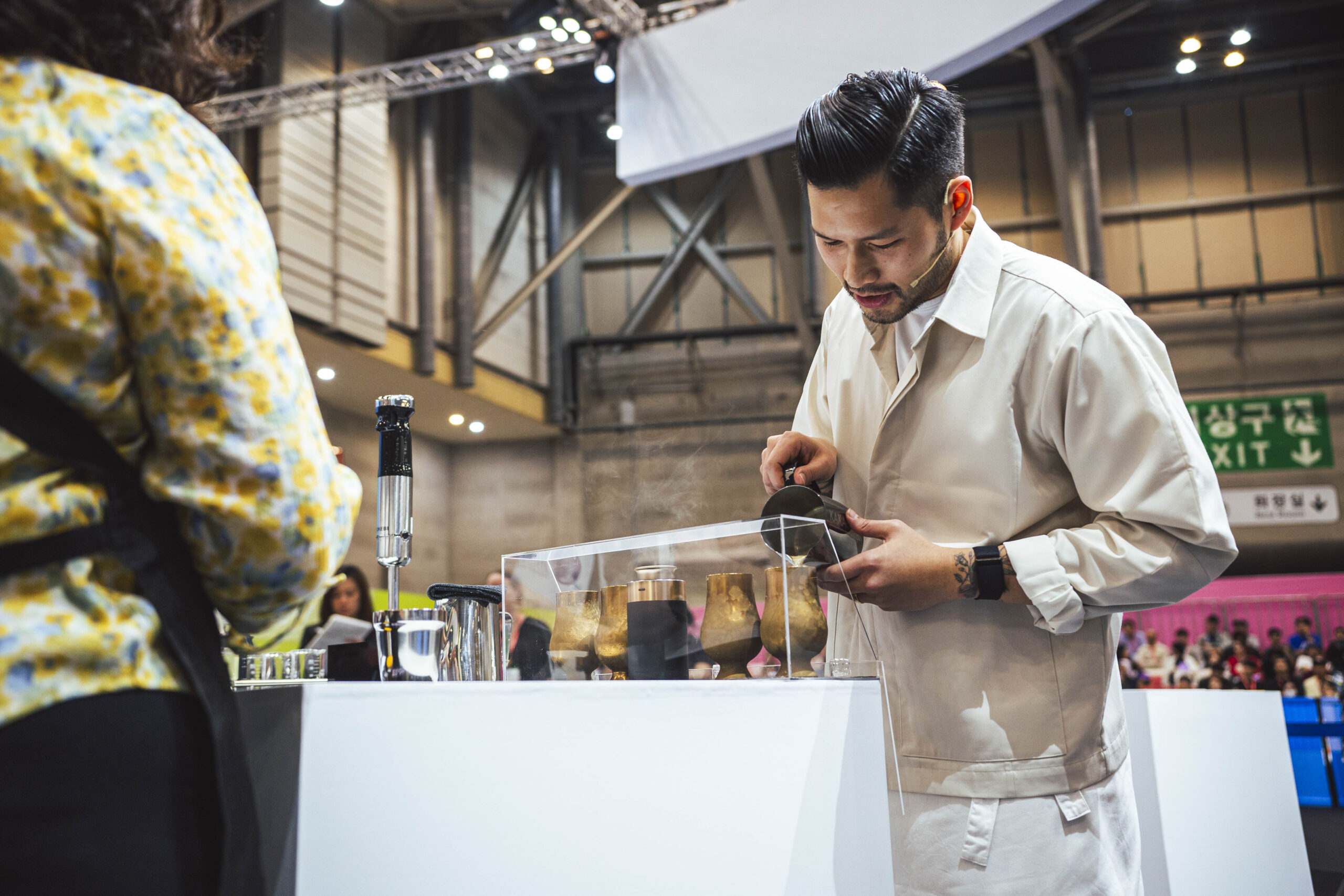
For the signature beverage, Aji espresso, a lemon juice-clarified milk blend, a palo santo aromatic infusion, a palo santo vanilla syrup, and Indonesian cacao nibs are combined and served at 50 deg C to create new flavors of honeydew, watermelon, and sage, with a silky texture with a lingering finish of black forest cake.
For the final course, the espresso, Jasin switches it up to the Finca Deborah Gesha, which he pulls at a longer 2.5:1 brew ratio, giving the drink notes of jasmine, orange blossom, orange, and honey, with a lingering silky golden raisin finish.
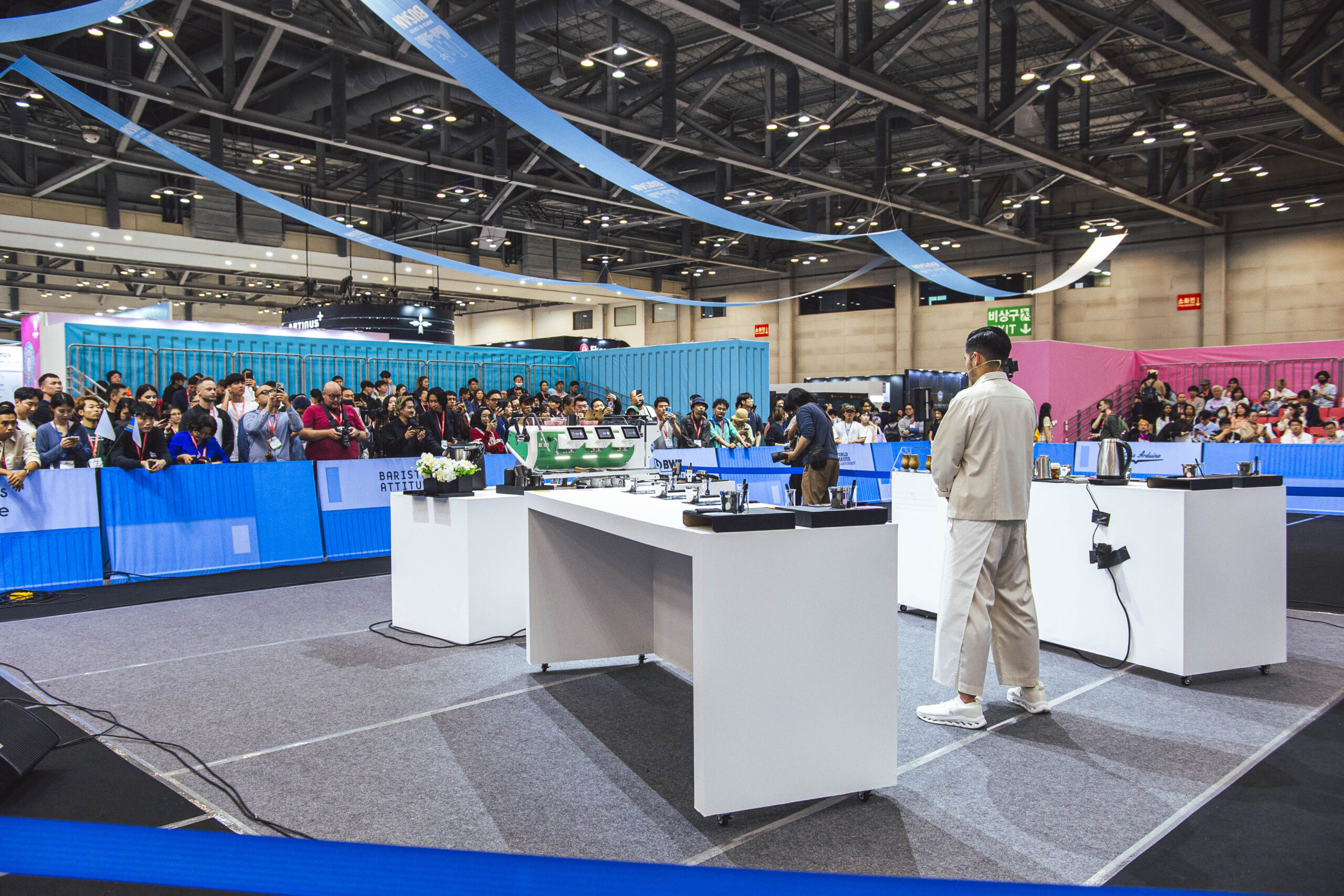
Mikael Jasin calls time on his 2024 season at 15:02.
Takayuki Ishitani (he/him), Japan
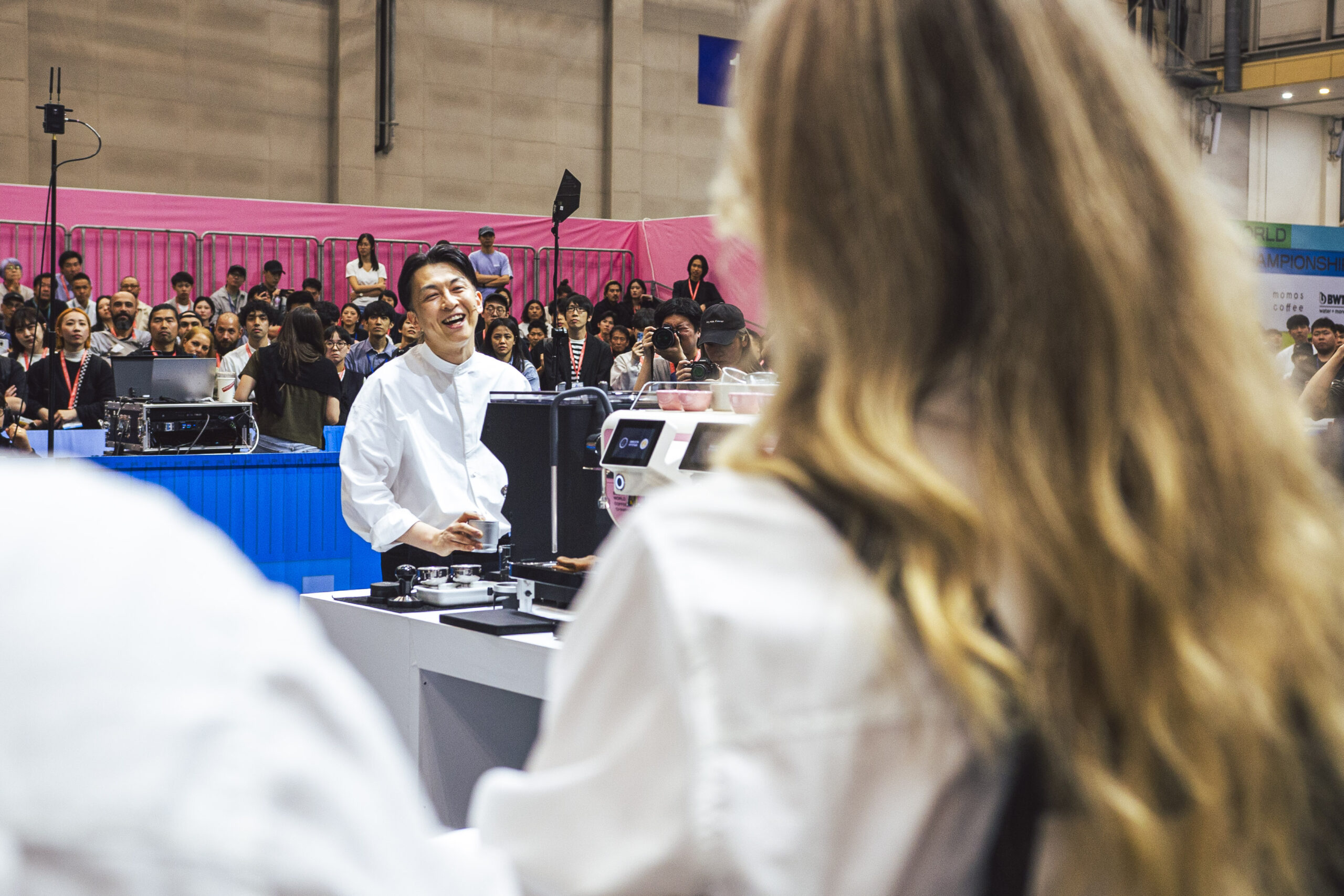
After over two decades in the industry, Takayuki Ishitani’s happy place is crafting perfectly balanced drinks. And today, for the mulit-time Japan Barista Champion balance starts with the coffee. He competes today with two coffees, a wash processed Gesha from Finca Deborah in Panama for its floral characteristics and a Caturra variety from Finca Milan in Colombia for its expressive stone fruit flavors.
Starting off with the espresso course, Ishitani combines 16g Gesha with 2g Caturra for a total output of 46g, pulled from chilled portafilter spouts. Stirred five times, it has notes of peach, orange, jasmine, with sparkling acidity, medium sweetness, and a long-lasting jasmine tea finish.

Ishitani is one of the only competitors in the Finals to manually tamp his espressos himself. With an old-school honest-to-goodness tamper. You love to see it.
Switching to 17g Caturra and 2g Gesha—that he extracts through a tea strainer to increase the crema—Ishitani combines rice milk and lactose-free cow’s milk in a 1:2 ratio, steamed to 51 deg C, blending with the espresso in a 4:1 ratio for notes of yellow peach, orange, and honey, with a yellow flower finish.
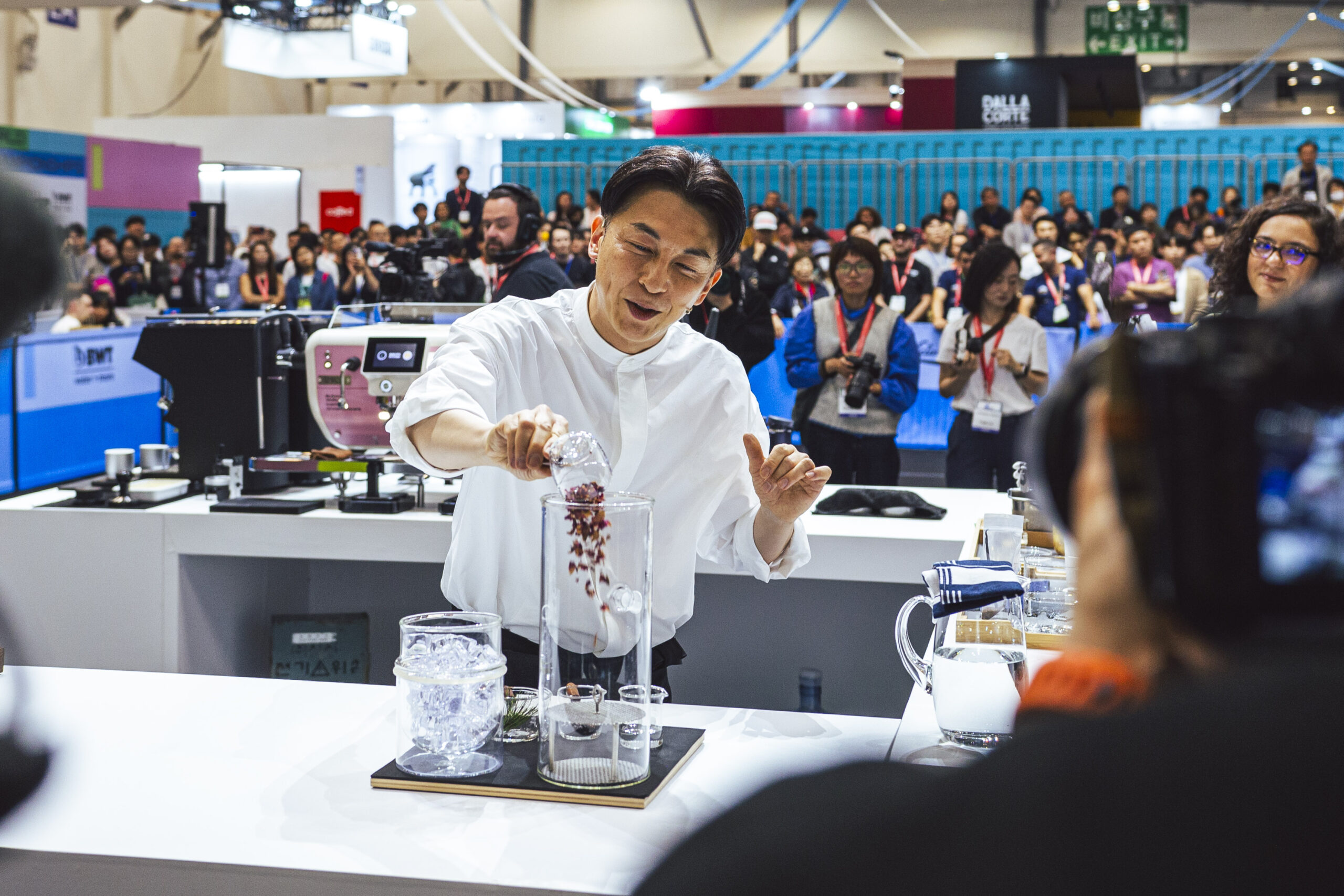
Drawing inspiration from a negroni, Ishitani adds to his 17:2 Caturra and Gesha espresso a rose, pine leaf, and juniper berry infusion representing gin, a pineapple a brown sugar fermentation akin to Campari, and a sous vide solution of coarse Gesha coffee and vanilla bean for the vermouth. Combined, it has notes of sage, white peach, black orange, apricot, and a caramel finish, with a juicy and silky mouthfeel and a lasting finish. “This is my happiest moment.”
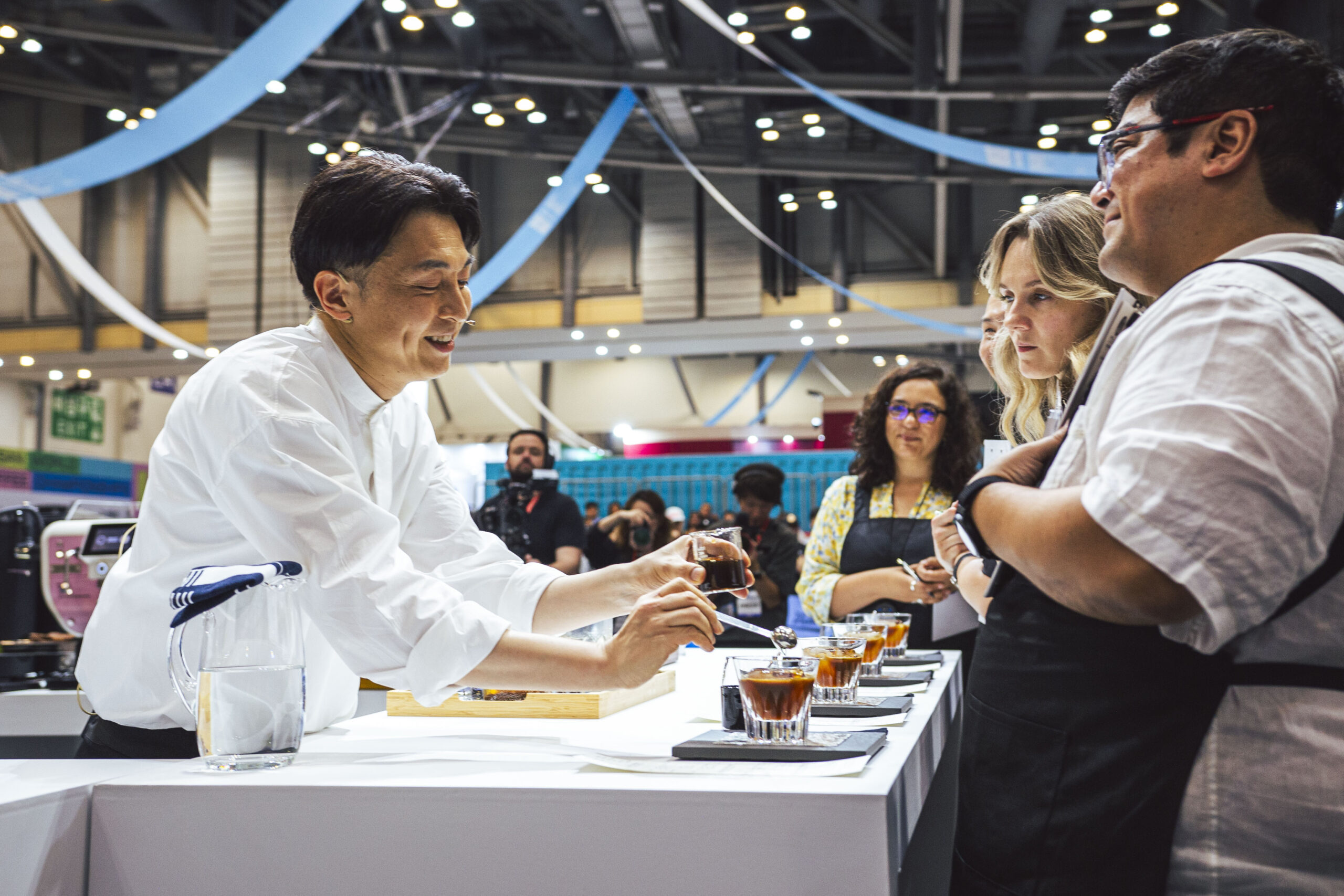
Japan’s Takayuki Ishitani calls time at 14:55.
Ian Kissick (he/him), Formative Coffee, Ireland
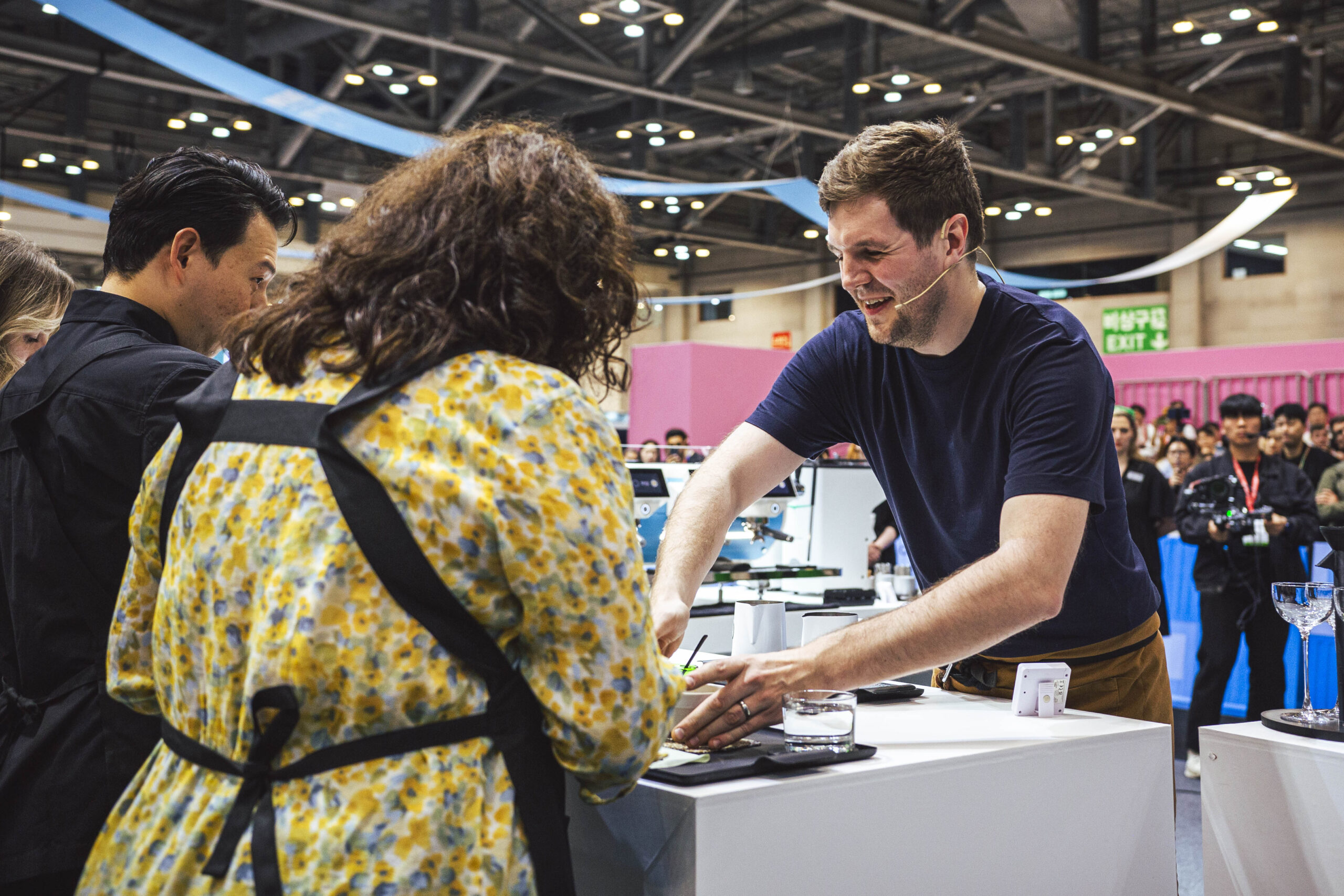
Stop me if you’ve heard this already today, but next up to the stage is Ian Kissick of Ireland. Due to a clerical error, Kissick was originally not included in the Semi-Finals, despite scoring well enough to move on. To rectify, he performed his Semi-Final routine this morning before the start of the Finals, where he once again scored well enough to move on, and here we are.
Kissick competes with two coffees today, a white honey processed Gesha variety grown at 2,000MASL at Finca El Placer in Quindio, Colombia and an anaerobic fermented Yellow Bourbon from Granja El Paraíso 92 in Colombia’s Cauca Valley, both roasted six weeks ago.
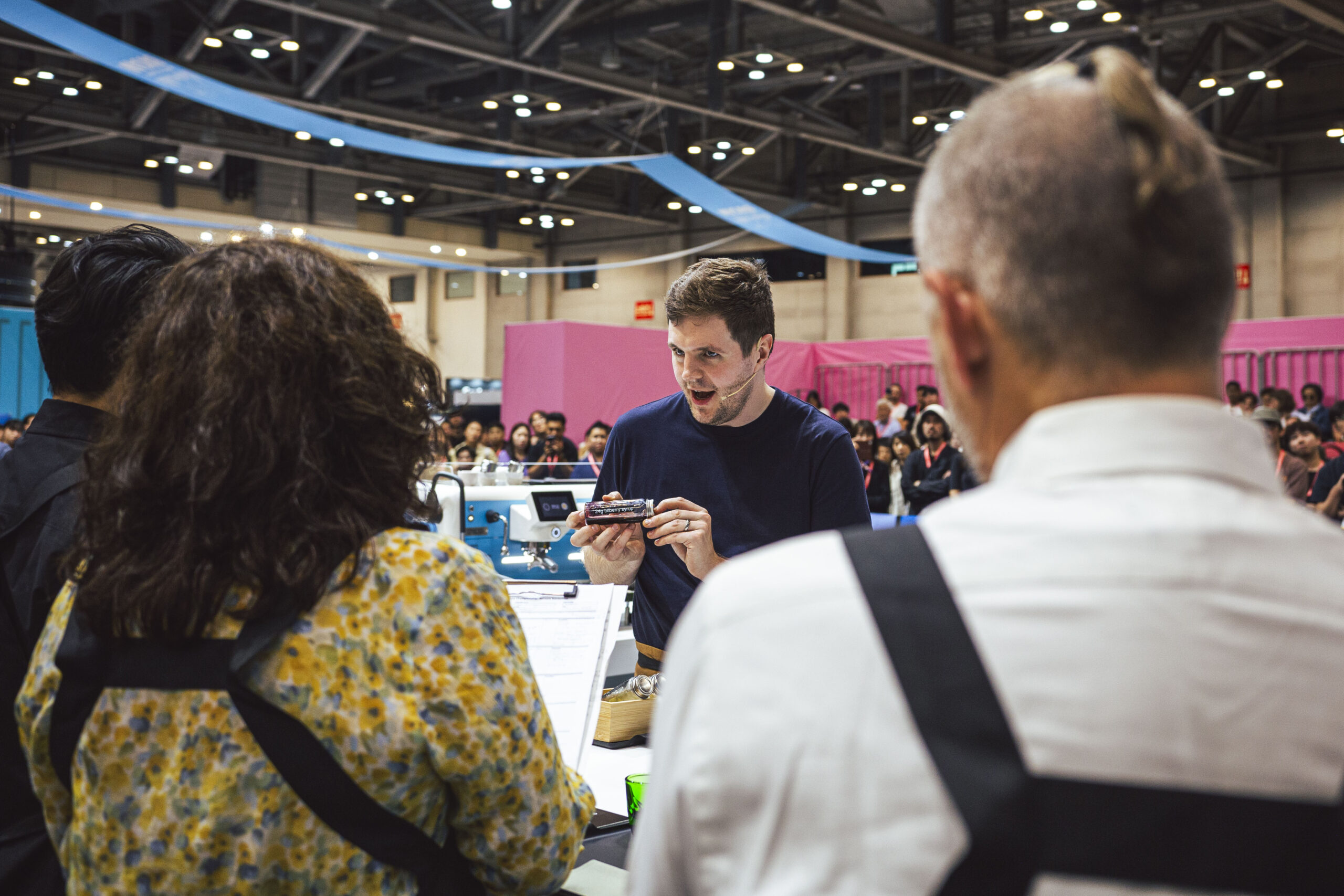
For his espressos, Kissick shakes the grounds before putting them in the portafilter in order to mimic densification,a process whereby smaller particles are trapped inside larger ones, boosting extraction and consistency Pulled over frozen spheres at 22g in and 60g out for 310 seconds using 94 deg C water and at a 22.5% extraction rate, the Colombia white honey Gesha has notes of bergamot, white grapefruit, green tea, and yuzu, stirred six times.
Melding tradition with innovation, Kissick uses a 50/50 blend of freeze-distilled Jersey cow milk and freeze-distilled oat milk, steamed to 55 deg C for an overall drinking temperature of 48 deg C, giving the milk beverage has notes of mango, peach, rum raisin, and cacao nib.
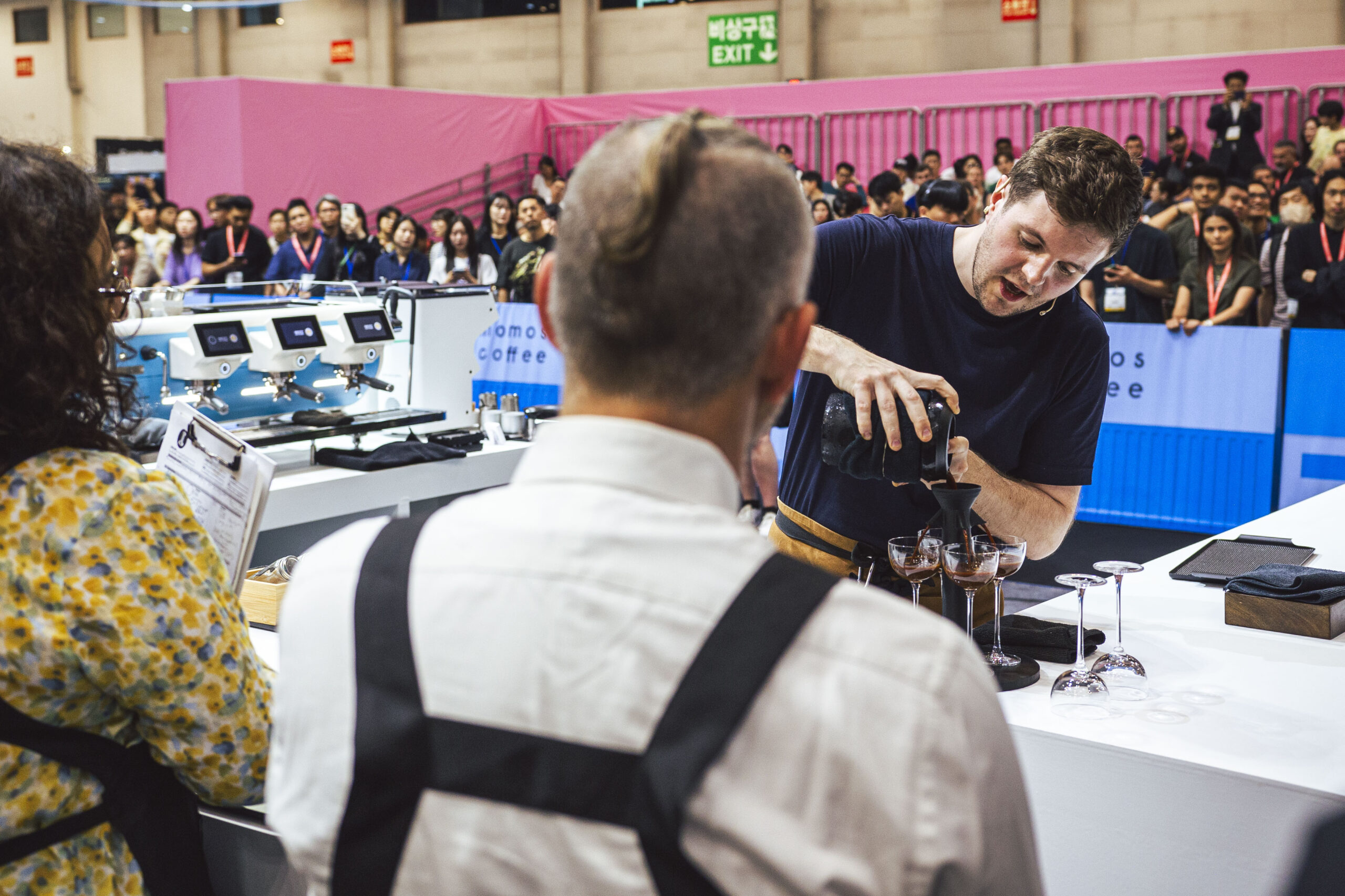
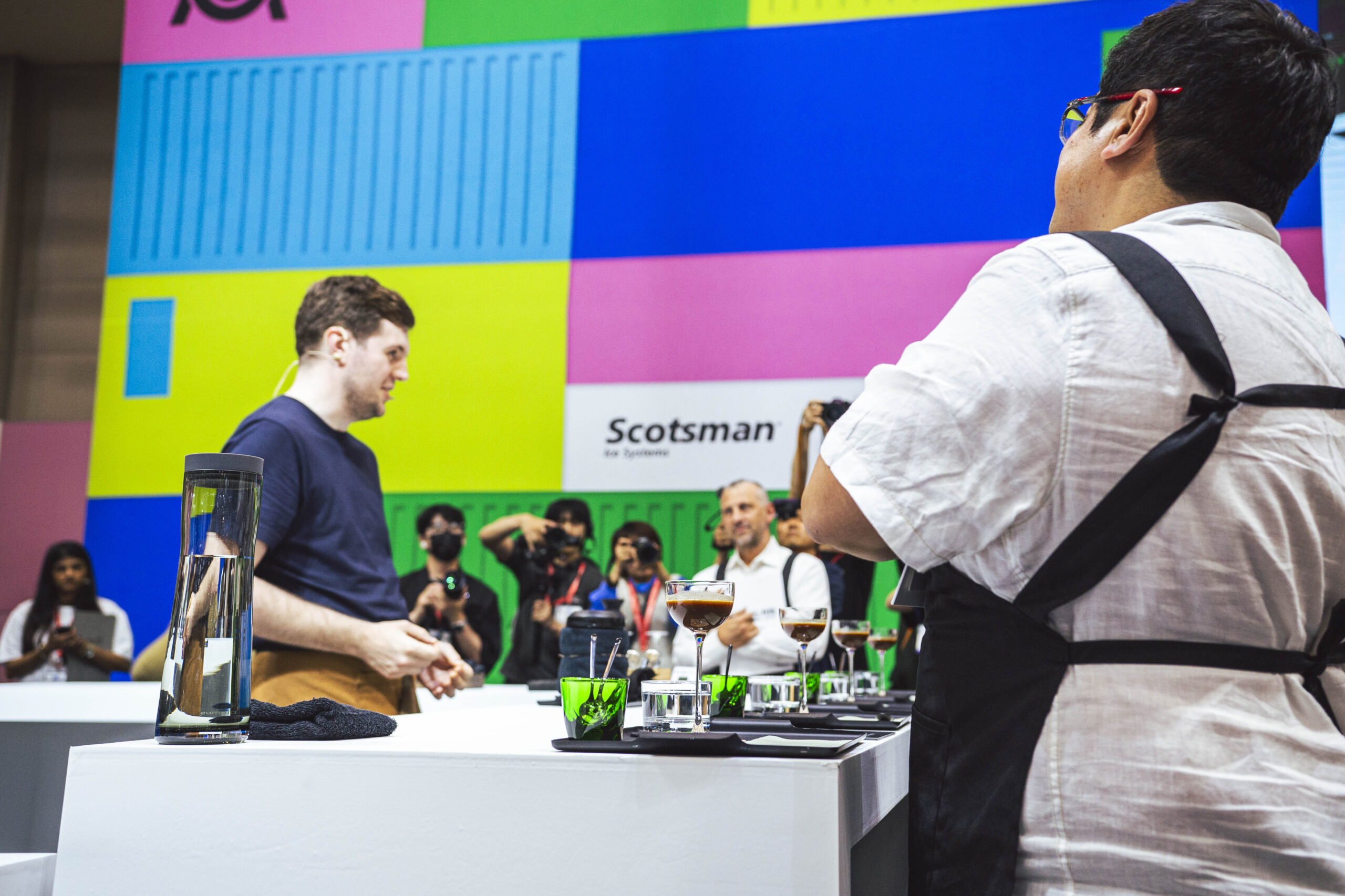
For his signature beverages, Kissick collaborated with some of the customers at his cafe. Collectively, they came up with a concoction consisting of chilled white honey Gesha espresso, bilberry syrup, juice from a tin of pineapples, and whey, all hyperchilled, presenting flavors of raspberry, peach, and white grape.
Ireland’s ian Kissick calls time at 14:54, concluding the Finals round of the 2024 World Barista Championship.
That’s a wrap! We’ll have the winners announcements very soon, so stay locked in!
Sprudge’s coverage of the 2024 World Barista Championship is presented by Pacific Barista Series and La Marzocco. Our coverage is supported by Created Co., Proper Syrup, Third Wave Water, and DiFluid.




